Posts Tagged ‘Japan’
8月 30, 2021

Yi Sha
BIRDS NEED TO SING
Last night the birds
have all slept in.
They were watching
the opening of the Tokyo olympics.
Not to partake in the humans’ carnival
after their great calamity,
but to help the origami pigeons
they folded for peace
with their songs.
Translated by MW on August 31st, 2021
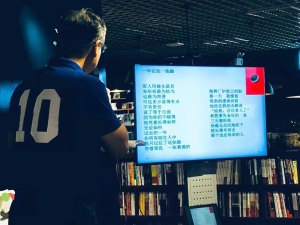
Yi Sha
VÖGEL WOLLEN SINGEN
Diese Nacht haben die Vögel
alle lange geschlafen.
Sie haben sich die Eröffnung
der Olympischen Spiele in Tokio angeschaut.
Nicht um teilzunehmen an diesem Karneval
nach dem großen Unheil unter den Menschen.
Aber um für die Papiertauben,
die für den Frieden gefaltet wurden,
zu singen.
Juli 2021
Übersetzt von MW am 30. August 2021

Yi Sha
VOGELRUF
Gott sagte, es werde Klang!
Und es war Klang,
und die Vögel sangen.
August 2021
Übersetzt von MW am 30. August 2021
《鸟鸣》
上帝说要有声
于是便有了声
有灵则鸣


《新诗典》小档案:伊沙,男性中国公民,当代著名诗人、作家、翻译家、编选家,五十五岁,写诗逾两万,出书百余本,中国口语诗之中兴者、大成者、光大者,近三十载始终影响着中国现代诗的发展态势,对中国现代文明进程有着积极的贡献。
伊沙推荐语:奥运会与世界杯,原本就是年代标记,延后一年举行的东京奥运会一定会成为大疫之年的重要标记,《新世纪诗典》应该以诗做出反应,别人没选出,那我自己来,而这是必须达到的目标:在当下性中爆发永恒性。爱诗者中体盲多,我来普及一个历史知识,是本诗利用的软掌故:1988年汉城奥运会开幕式上,放飞和平鸽时,一部分鸽子飞入圣火,被烧死了,放飞仪式随之取消,此次在东京以纸鸽复活。本诗当居八月下半月冠军。
况禹点评《新诗典》伊沙《鸟欲鸣》:奥运一奇景,它源自另一则奥运逸事,体现了人的进步,文明的进步,且在全球大疫之下,更具震撼和警示。
黎雪梅读《新世纪诗典》之伊沙《鸟欲鸣》:一首净化心灵的好诗。汉城奥运会飞入圣火的鸽子被烧死,这次东京奥运会以纸鸽的形式复活,这么做也许是出于安全的考虑,为了避免悲剧的再次发生。只是纸鸽毕竟不是活物,它永远不可能发出鸟儿的鸣叫。于是一群围观的鸟儿便想替纸鸽“发出鸣叫”,所以这些不是普通的鸟儿,鸟欲鸣而必鸣,只因它们有悲悯的情怀,以及向往和平的心愿,这足以令人肃然起敬。什么时候我们能够处在一个幸福祥和的大环境中,耳边听到的天籁,是天空传来的真正的和平鸽的鸣叫(而不是由别的鸟儿替其发声),相信那才是你我想要拥有的幸福生活。本诗聚焦当下残酷的现实,紧握时代的脉搏,体现了一个优秀诗人应有的责任和担当,当然这也是内心的需要和时代的要求。
简评伊沙《鸟欲鸣》|雪也
“昨夜”,指的是东京奥运开幕时。“鸟儿睡得都晚”,这是诗人的主观判断。鸟儿为何睡得都晚?因为“他们在围观”,注意此处诗人没有用“它们”,而是用“他们”,也就把鸟儿和人平等看待。鸟儿的围观,不是参与人类的狂欢,而是替和平纸鸽发出鸣叫。为何是纸鸽呢?且看诗人自荐语提到的掌故:1988年汉城奥运会开幕式上,放飞和平鸽时,一部分鸽子飞入圣火,被烧死了,放飞仪式随之取消,此次在东京以纸鸽复活。鸽子被烧死,多么惨烈的场面,虽然是无意而为之。其他诗人没有注意到,但伊沙觉得必须要写,要达到的目标就是——“在当下性中爆发永恒性”,这也是诗人应该达成的一致目标。鸟鸣,大自然中美好的天籁之音。毋庸讳言,本诗作者站的更高,想的更远。这是一首大诗!关乎人与自然,关乎世界和谐。
马金山|读伊沙的诗《鸟欲鸣》的十一条:
1、诗的共情力,也是一种境界与能力;
2、把一首诗写透之前,首先要先写通亮,那么它所蕴含的意义和价值将超乎想象;
3、伊沙,原名吴文健,1966年5月19日生于四川成都,当代诗人、作家、翻译家、编选家。1989年毕业于北京师范大学中文系。现居陕西西安,任教于西安外国语大学中国语言文学学院;
4、伊沙其人,越来越是一位精神贵族,这不单单仅靠其写了多少诗,出了多少本书,编了多少人的诗,或者就一句对于文学的热爱所能够阐释清楚的,更是一种信仰;
5、伊沙的诗,从题材的角度出发,既包罗万象又丰富多姿,而从内容的角度来看,具有良好的语言质地和细节抓取,且深入思想内涵与现实生活;
6、回到本诗,在一连串的现实生活中的鲜活事物,所标注出来的内容留下了时代最重要的痕迹,有知识的凝思,还有对生命的悲悯情怀,以及对和平的有效诠释;
7、短短九行,从时间到空间,从大事件到人类文明,再从自然到和平,无不透着精神与力量,有责任坦露,还有胸怀宽广,更有时代之光;
8、诗中描写的事物层层叠叠,不仅饱满细腻,而且厚重有力,不鸣则已,一鸣即歌,是意识和观念,还是热爱与聚焦;
9、尤其是诗的最后部分,把整首诗提升到极致,个中奥妙无穷魅力,散发出迷人的弦外之音;
10、本诗给予诗人的启示:“汉语的博大精深,自身所包含的东西,丰富而又精彩;
11、时代之诗,情怀之诗,人类之诗。
标签:animals, birds, ceremony, day, disease, dove, doves, history, international cooperation, Japan, life, memory, music, nations, night, olympic games, opening, pandemic, peace, people, pigeons, poetry, ritual, singing, song, sound, sounds, sports, time, times, world, yi sha, 新世纪詩典, 伊沙
发表在 1960s, 1966, 1970s, 1980s, 1989, 1990s, 2000s, 2010s, 2020, 2021, 20th century, 21st century, Antique times, August 2021, July 2021, Middle Ages, NPC, poetry, Translations, Yi Sha, 新世纪诗典, 伊沙 | Leave a Comment »
8月 1, 2021
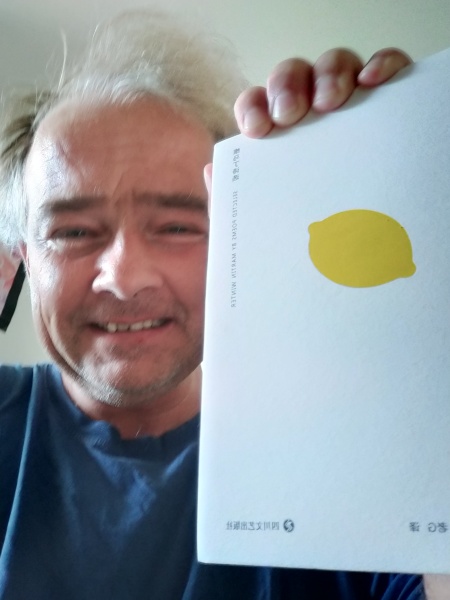
NEW MOUNTAINS AND SEAS
Japanese
are like Germans.
Chinese
are like Italians.
Other people
are in between.
The alps
are as deep
as the Mediterranean sea.
Written in Chinese 1/31/21, English version 8/1/21
NEUE MEERE UND BERGE
deutsche
sind wie japaner
italiener
sind wie chinesen
alle anderen
sind dazwischen
die alpen sind so tief
wie das mittelmeer
31. 1. 2021 Chinesisch
Deutsche Fassung Sommer 2021


伊沙:什么是诗人?对人公平者,维马丁就是如此。这首诗太难得了,叫人肃然起敬!当居8月上半月冠军。本主持内蒙古武川县推荐。
新世纪诗典11,NPC8月2日,3773首,1193人。第15个维马丁(奥地利)日
0801况禹点评《新诗典》维马丁《新山海经》:完全同意诗中的印象。每次看意大利电影,那些剧中人在街上唠唠叨叨,包括家长管教孩子,都让我联想到童年的记忆。日本人近似德国人,这一点几乎也是不少同胞的共同印象。但它们现在出自欧洲诗人笔下,还是让人有些惊讶。但诗的后三分之一更惊人,把地中海的深度和阿尔卑斯的高度并提,我相信中国诗人肯定不会想到,可马丁这么写了——用汉语!了不起,祝贺他。

Calligraphy by Huang Kaibing
黎雪梅读《新世纪诗典》之维马丁《新山海经》:本诗虽小,却文化底蕴深厚,内涵极其丰富。从开头诗人用类比的手法,表达对“日本人/像德国人/中国人/像意大利人”的认知,不是指这四个国家的人在外貌上的近似,而是指他们在精神境界、做事方法、以及在饮食、文化、对家庭的重视、对民族历史的骄傲等方面的高度契合。然后由人到自然界山水,宕开一笔得出“地中海/跟阿尔卑斯山/一样深”的结论,着实令人惊叹于维马丁老师学识的广博、灵动的气韵及对汉语驾轻就熟的能力,涵盖了自然地理和人文地理特知识,实在难能可贵。

Calligraphy by Huang Kaibing
马金山|读维马丁的诗《新山海经》的十一条:
1、诗歌是人生的过程,也是内心以及精神的反映,更是生活的脉络,否则就不是好的文本,至少不会是诗;
2、顾随说的好,“诗根本不是教训人的,只是在感动人的”,如果以诗为刀为枪,那么这些人,是不受人尊敬的,甚至是不会被历史认可的;
3、维马丁, 1966年六月生于奥地利维也纳。诗人、译者。教过书,在《人民画报》、《人民文学》等报刊作翻译、编辑。代表作《报摊》(晚报,晚报!)等;
4、维马丁的诗,有一种自然的现实感与本真面貌,还有个人化对生活世相的本质认知和观念,在汉语的博大精深里,饱含人性的光辉与思想的深彻;
5、本诗以人与物之间,人种差异与物体关系之间,人文与地理之间,构成了奇妙的内在精神文明,质感透彻,语言生动而通灵;
6、诗一开头,由两个比喻组成,在东西人种的相似程度上进行有效的对比与呈现,简约而不失本真的样子,纹理清晰可见;
7、五六行,既是内容的过渡,还是精神的又一次爆发,与此同时,还将人引入到了物,将山海经的话题传递出来,颇有文化底蕴与人生哲理;
8、最后一节,在自然风物的流线下,显现出自然的生态文明,还原了深似海这个形象的存在,本真、本象;
9、标题系于诗身,文字融于自然,是其味,更是诗格的体现;
10、本诗给予诗人的启示:“作品是生命的体现,还是精神的再度燃烧”;
11、风物之诗,文明之诗,人性之诗。
庞琼珍读《新世纪诗典》维马丁《新山海经》:一首奇绝的诗!一首让我拍案叫绝、又反复端详、久久沉思的诗,一首诗能够抵达的地域广度、人性深度和历史长度,它都做到了。这首诗是有阅读门槛的,真正读懂不容易。而我更关注的是怎么写出来的。首先是地域广度,如果没有阿尔卑斯雪峰的跋涉攀登,地中海蓝色海岸的扬帆徜徉,比较和转换不会这样自如,好在奥地利是意大利的邻居,诗人再熟悉不过了。第二是人性深度,如果没有对德国人和日本人、意大利人和中国人的深刻洞察和把握,也得不出那样自然的结论。第三是历史长度,作为汉学家的诗人,用的这个诗题让我这个中国诗人自愧不如啊。要有怎样的博学,才能写出这首诗?要有怎样的提纯能力,才能写出这首诗?深奥,朴素,极简,浓缩在9行34字中,字词精准在握,诗意浩瀚无边。让我叹服。
黄平子读维马丁《新山海经》
——《新世纪诗典》3773
新山海经
维马丁
日本人
像德国人
中国人
像意大利人
其他人
都在中间
地中海
跟阿尔卑斯山
一样深
2021.1.31
黄平子读诗:说实话,这首诗我没怎么看懂。看不懂就不装懂。诗题既然叫《新山海经》,当然就应该有所本,这所本的,就是《山海经》。说到《山海经》,肯关不该忽视这样一些关键词:神话传说、地理知识、寓言故事、远古异人、状貌风格……“日本人/像德国人/中国人/像意大利人”这是拿了四国人进行对比。诗人只说像,没有说怎么像,哪方面像。这是笼统的坏处,也是笼统的好处。“其他人/都在中间”,从这一句看,诗人是把日本人、德国人放在一极,把中国人、意大利人放在另一极,世界上的其他人,则处于折中的位置。以上是概写世界人物。“地中海/跟阿尔卑斯山/一样深”,这是具体写两大地貌。地中海是世界上最古老的海之一,历史比大西洋还要古老。地中海沿岸还是古代文明的发祥地。阿尔卑斯山脉是欧洲最大的山脉。根据现代板块学说,地中海位于亚欧板块和非洲板块的交界处,两大板块不断地碰撞、挤压,使地中海面积不断地缩小、变深。相反,阿尔卑斯山在两大板块的不断碰撞和挤压下却日渐抬升。地中海当然和阿尔卑斯山一样深,因为它们原本就是两大板块碰撞、挤压挤压下的产物。所不同的是,一个向下伸展,产生了“深”。一个向上伸展,产生了“高”。
2021年8月1日20点47分
君儿读维马丁《新山海经》http://www.weinisongdu.com/shareOpus?id=55779686&promote_id=957250
新山海经
维马丁
日本人
像德国人
中国人
像意大利人
其他人
都在中间
地中海
跟阿尔卑斯山
一样深
2021.1.31
신 산해경
MARTIN WINTER
일본인들은
독일인 같고
중국인들은
이딸리아인 같고
다른 사람들은
그 사이
지중해에 있어
알프스산처럼
깊다
2021.1.31
全京业 洪君植 译
标签:alps, asia, china, Chinese, classics, comparisons, 维马丁, East Asia, Europe, Germany, history, impression, Japan, knowledge, language, Martin Winter, measure, Mediterranean, memory, mountains, myth, nations, NPC, people, peoples, poetry, sea, words, 新世纪詩典
发表在 1966, 1970s, 1980s, 1989, 1990s, 2000s, 2010s, 2020, 2021, 20th century, 21st century, Antique times, August 2021, Middle Ages, NPC, poetry, Translations, 新世纪诗典 | Leave a Comment »
7月 23, 2021

Miyuki Kawasaki
NACHT
Vom Berg oben seh ich,
Straßenlichter sind Goldfische,
die durch die Nacht
schwimmen.
Im dunklen Aquarium
funkelt
ein Schwarm.
In der Nacht
seh ich im Glas des Aquariums
am andern Ufer den Schatten des Fuji.
Goldfische schwimmen
im dunklen Meer.
Goldfische schwimmen
zum anderen Ufer zu Dir.
Izukogen, März 2021
Übersetzt von MW im Juli 2021
 Miyuki Kawasaki, Sprach- und Literaturwissenschaftlerin, Dichterin. Lebte viele Jahre in Shanghai, schreibt auf Japanisch und Chinesisch. 《新诗典》小档案:河崎深雪(河崎みゆき)日本人。女,文学博士。诗人。诗歌作品《武汉的樱花》和《一行诗》入选《新世纪诗典》。诗歌作品登载于《香港文学》等。日本语性别语言学会评议员,日本社会语言科学杂志编委。曾在上海交通大学日语系任教,现在日本,国学院大学研究生院任教。出版物有中文著作《汉语角色语言研究》2017年商务印书馆。在日本杂志上写过《在上海的诗人》等文章。
Miyuki Kawasaki, Sprach- und Literaturwissenschaftlerin, Dichterin. Lebte viele Jahre in Shanghai, schreibt auf Japanisch und Chinesisch. 《新诗典》小档案:河崎深雪(河崎みゆき)日本人。女,文学博士。诗人。诗歌作品《武汉的樱花》和《一行诗》入选《新世纪诗典》。诗歌作品登载于《香港文学》等。日本语性别语言学会评议员,日本社会语言科学杂志编委。曾在上海交通大学日语系任教,现在日本,国学院大学研究生院任教。出版物有中文著作《汉语角色语言研究》2017年商务印书馆。在日本杂志上写过《在上海的诗人》等文章。

伊沙:在距推迟一年举行的2020东京奥运会开幕还有4小时的时刻,推荐一位日本诗人用中文写的诗。国际奥委会主席巴赫先生对当前的世界做了最准确的概括:"在这动荡、脆弱的世界上……"在全人类共克时艰中,在地球的艰难时世,不论体育还是文学,不论运动员还是诗人,都应该坚守住自己在文明中的角色,并做出相互的呼应。不要忘了:古代奥运会,诗歌是比赛项目。
况禹点评《新诗典》河崎深雪《夜景》:信息量不低。至少我是头一回知道,伊豆原来算是高原。这一点无论是前几年身临其景,还是早年读川端的小说、吉永小百合的电影,都不曾知道的。山下的灯火,如金鱼缸中的小鱼,这种比方和想象非常独特。把“大”写“小”,是有难度的。本诗完成得漂亮。
庞琼珍读《新世纪诗典》河崎深雪《夜景》:很特别的一首诗,街灯,金鱼,街道,金鱼缸,海洋,山顶,伊豆高原,富士山,倒影,你在的地方……唯美,深邃,静谧中有微波。汉语的表达很新颖,奇妙,节奏和分行也很别致。在疫情仍然肆虐的东京,这样的安宁弥足珍贵,一定可以慰藉更多的心灵。具有日本文化特点的汉语诗,也是深雪博士的一个贡献吧,特别是在东京奥运会即将开幕之时。
张小云
河崎深雪《夜景》
那回是白天从游乐场
遥看富士山的“正面照”
也就容易观想河崎深雪的“夜景”
这世界,就如钻进拍摄架
翻起黑幕看倒映在镜框的影像
恰好正是诗人所晒的景致
是的,金鱼游弋的玻璃缸
对着黑暗是必须“游到对岸的”
今晚奥运的“夜景”很快来
不知金鱼们是否“游到你在的地方”
但读完诗仍感觉还钻在黑幕里
看着世界的底片
2021.7.23
标签:aquarium, fish, Japan, Kawasaki Miyuki, light, lights, Mount Fuji, mountain, night, NPC, poetry, reflection, sea, shore, streets, swimming, water, 新世纪詩典, 河崎深雪
发表在 1960s, 1970s, 1980s, 1990s, 2000s, 2010s, 2020, 2021, 20th century, 21st century, July 2021, March 2021, Middle Ages, NPC, poetry, Translations, Uncategorized, 新世纪诗典 | Leave a Comment »
7月 20, 2020

Lu Fuxiang
MUSIKALISCHES OPFER
Gegen Abend
jogg ich am Fluss.
Unter einem dürren Zedrachbaum
spielt ein weißhaariger Mann
Saxophon.
Ich setz mich neben ihn auf eine Steinbank,
ein bisschen ausruhen.
Hör ein Stück fertig,
heb unwillkürlich meinen Daumen.
„Sind Sie Künstler?“
Er nimmt einen Schluck Tee,
„Nein. Als junger Mann
war ich Signalhornist.
Damals haben die Japsen von dort
den Fluss überquert.
Das Wasser war ganz rot …“
Ich bemerke, in dem Blumenbeet
neben dem Etui für sein Instrument,
stecken lauter Räucherstäbchen.
5. April 2020
Übersetzt von MW im Juli 2020
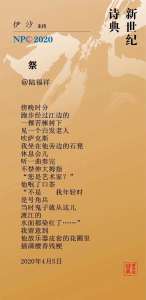
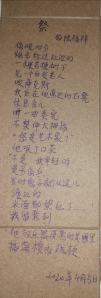
标签:china, 陆福祥, history, Japan, Lu Fuxiang, memory, music, NPC, people, river, running, sport, tree, war, 新世纪詩典
发表在 1930s, 1940s, 2020, 20th century, 21st century, April 2020, Uncategorized | Leave a Comment »
4月 13, 2020
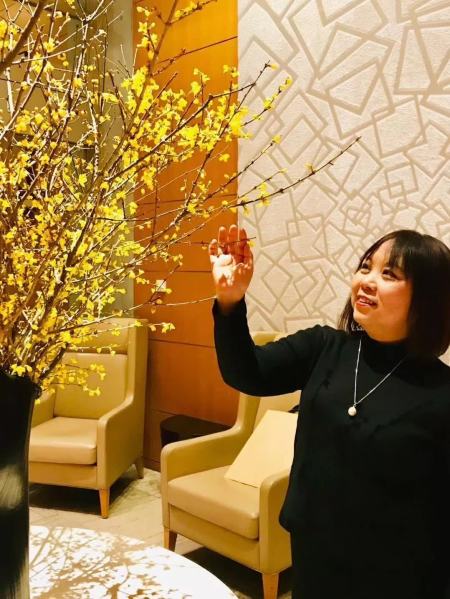
Miyuki Kawasaki
KIRSCHBLÜTEN IN WUHAN
Ich bin mit Wuhan verbunden
Ich bin eine Japanerin
die achteinhalb Jahre in Wuhan gelebt hat.
Jangtse-Wasser getrunken.
Wuhan-Nudeln, Lotus, Wuchang-Fisch gegessen.
Kraftvollen, schallenden Dialekt gehört.
Die Gassen der Konzessionsbezirke erforscht, die Gelbe Kranichpagode bestiegen…
Damals
hab ich jedes Jahr die Kirschblüten in der Uni Wuhan betrachtet.
Hab viele Freundschaften geschlossen,
unvergessliche Tage erlebt.
Frühling 2020, Wuhan abgeriegelt.
Freunde arbeiten im Krankenhaus,
Spuren von Mundschutz auf den Gesichtern.
Studenten von damals, heute Beamte in Wuchang.
Mit jungen Freiwilligen zusammen,
manche sind selber Freiwillige, liefern für Krankenhäuser,
überlassen ihre Schutzanzüge den Ärzten, die sie nötiger brauchen.
Manche Freunde schicken mir Fotos zum Heulen.
Ich bin in Tokio,
schau täglich online, was in Wuhan los ist,
lese das Tagebuch der Schriftstellerin Fang Fang.
Zum dritten Monat im Mondkalender blühen die Kirschbäume
der Uni Wuhan. Blütenblätter wehen einsam.
Wuhan wird
bald endlich aufgesperrt.
Nachdem tausende Seelen verweht sind.
25. März 2020
Übersetzt von MW im April 2020
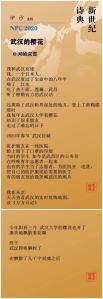

标签:blossoms, cherry blossoms, china, culture, disease, food, history, hospitals, Japan, Kawasaki Miyuki, language, literature, lunar calendar, medicine, memory, NPC, pandemic, people, river, spring, students, teaching, tradition, virus, volunteers, Wuhan, 河崎深雪
发表在 1960s, 1970s, 1980s, 1990s, 2000s, 2010s, 20th century, 21st century, April 2020, February 2020, January 2020, March 2020, Middle Ages, NPC, poetry, Translations, Uncategorized, 新世纪诗典 | Leave a Comment »
3月 19, 2020
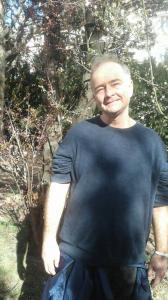
11 QUESTIONS asked by Zhuang Sheng
1. Could you please introduce yourself?
Martin Winter, Chinese name 维马丁, poet and translator from Chinese into German and English.
2. Where did you spend this year’s Spring Festival?
At home in Vienna. Yi Sha 伊沙 and six other poets from China (Tu Ya 图雅, Jiang Huhai 江湖海, Xiang Lianzi 湘莲子, Pang Qiongzhen 庞琼珍, Bai Li 白立 and Chun Sue 春树) had just left, after spending over two weeks in Austria in January. You could also say we had Spring Festival together, in Innsbruck in Tyrol in the alps, with poets there, and in Vienna, also with friends. Bai Li was our best cook, and all of them made really good food, we made Jiaozi together, you know, Chinese dumplings, and many other dishes. Yi Sha likes to cook tomatoes and eggs, very simple dish, but very good. We celebrated together, and they went back one day before the lunar new year.
3. How has this virus crisis affected you?
Actually, here in Austria it has only just started to affect everyone. Schools are closed, also most shops. I have been working from home before already, so there is no big change. But I have to be afraid of both short-term and long-term effects in the publishing world, in China and in Europe.
4. How do you spend your time now?
I work from home, so the only big change is that my wife and my son are also home all day. My daughter already has her own apartment, but it is close by. She moved in February, when it was still normal. She was with us on the weekend, we are going to see her again tomorrow or so. People are supposed to stay at home, but you can go shopping for food, medicine, tobacco.
5. How is your mood these days?
Ok, maybe a little worried, but ok, not bad.
6. What are you most satisfied with from before this crisis? Can you give an impression of the efforts against the virus in your location?
My poems. My work. My family, friends, contacts, local and international. The measures against the virus here in Austria and in Vienna have only just started in earnest. There is some criticism that tourism was stopped too late in Tyrol. People who came to ski from all over Europe, and some got sick there, maybe a lot.
7. What is the best thing you have eaten during this crisis?
My wife is at home, so she cooks more. She likes to buy lamb and beef from the Muslim halal butcher at the vegetable market close by. Our vegetables are from there too. My son likes to help with cooking. Today they made lasagna, from scratch. Most food shops are open, even some restaurants for take out. Some Chinese shops have closed. Hope there are still one or two open in the city. But that’s just for spices and sauces like 老干妈.
8. What has worried your family and relations in this crisis?
My parents stay at home. My sister lives very close to them, and her sons help them. One of them is studying to be a doctor, he was working in a hospital. Hope he is ok.
9. In this global crisis, what do you think about poets writing poetry? Have you written poetry in this time?
This is a very good time for writing, reading, translating, even for distributing and discussing poetry, at least online. I have followed the situation in China. People compared the slogans warning you not to go out, some of these were very nasty and violent, to the writing on boxes sent from Japan, relief goods for Wuhan. There was Tang poetry on there, to remind people of their common heritage. Something about mountains and streams, 山川異域, 風月同天. Reminds me of Du Fu, mountains and rivers remain. So people compared this ancient culture to the crude slogans and said we should learn from the Japanese. Then one guy wrote an article in the Yangtze daily 长江日报 on February 12 and quoted Adorno who said poetry after Auschwitz was barbaric, so we don’t need poetry from Japan, because of what the Japanese did in the war. Any simple slogan was better, no poetry required, he said. But Tang poetry is very much what defines China, Chinese culture, also poetry in general. So everyone trashed this guy online. And people wrote even more poetry than before, a lot of it related to the crisis. Poems for Dr. Li Wenliang, the eye doctor from Wuhan who was one of the early whistle-blowers in late December 2019, and got reprimanded, and continued to work and died from the virus. That was world news, everyone knows this, also here in Austria. So in China on the whole there is a creative burst in this crisis, which is a very good thing, it gives hope. Some of these new poems are really very, very good. Yes, I have written a few poems myself. Some are related to China. I’ll see how it goes here in Europe. People have to stay at home, so they have more time for artistic pursuits, making music, for example. Singing from the balconies.
10. When the crisis is over, what are you most eager to do?
Don’t know yet, it has only just started here. Go out, meet people. My book is coming out in China, “Finally We Have Snow”, translated by Yi Sha. Should have come out in February. So I had planned to present the book in China this spring, at the Austrian embassy in Beijing, and at other places, maybe Xi’an etc. Anyway, my expertise is in intercultural, international contact with Chinese language, literature, poetry. So I am most eager to work in this field.
11. What do you think about the global situation?
It has brought people together. It is good for the climate, hopefully also for the social climate locally and internationally. There are always people who play us and them, but people do have a lot in common, much more than we realize. And now we have this one thing in common, globally. Everybody seems to agree on that.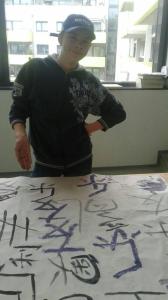
庄生访谈:十一问
1.请您做一下自我介绍?
2.您在哪里过的春节?
3.此次疫情对您产生了哪些影响?
4.您每天是如何打发时间的?
5.您目前的心境如何?
6.回顾疫情之前的岁月,什么让您最满意?您可以就您所在地的疫情及防控情况谈一谈您的感受吗?
7.疫情当中,您吃过最美味的东西是什么?
8.在这次大疫当中,有什么使您的家人很不安?
9.在这次全球流行病中,您对诗人写诗怎么看?您作为诗人写诗了吗?
10.疫情过后,您最想做什么?
11.您对当下,全球疫情形势怎么看?
(请被访问者尽量简洁回答,随稿附上一张生活照和50字以内的简介,感谢!)
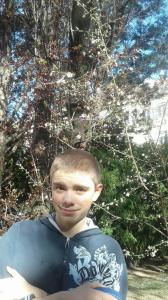
标签:Bai Li, boxes, Chinese, Chun Sue, crisis, 白立, disease, family, Fascism, food, friends, help, history, Innsbruck, Japan, Jiang Huhai, Jiaozi, life, lunar calendar, memory, new year, NPC, Pang Qiongzhen, poetry, poets, spring, spring festival, spring.catastrophies, Tu Ya, Tyrol, virus, work, world, writing, Wuhan, Xiang Lianzi, yi sha, Zhuang Sheng, 图雅, 庄生, 庞琼珍, 春树, 江湖海, 湘莲子, 伊沙
发表在 2002, 2003, 2005, 2010s, 2020, 2081, 20th century, 21st century, December 2019, February 2020, January 2020, March 2020, Middle Ages, NPC, poetry, Translations, Uncategorized, Yi Sha, 新世纪诗典, 江湖海, 伊沙 | 2 Comments »
11月 20, 2019

Zhang Zhizhen
DIALOG
Magst du Rock ‘n‘ Roll?
Sehr!
Welche Rock-Gruppe magst du?
Die B’z!
Was bringt dir das?
Ich bin ein wahrer Fan, geh mit meinem Idol ans Ende der Welt!
Trenn dich von ihnen!
Wieso?
Ich mag auch die B’z!
Häh?
Du nimmst mir mein Ende der Welt!
2019-01-13
Übersetzt von MW im November 2019
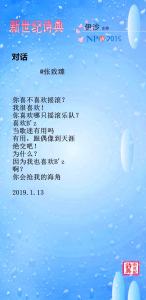

标签:china, dialogue, East Asia, end, fan, fans, generations, Japan, music, NPC, people, poetry, rock music, talk, world, Zhang Zhizhen, 张致臻
发表在 2000s, 2006, 2010s, 2019, 20th century, 21st century, January 2019, Middle Ages, November 2019, NPC, poetry, Translations, Uncategorized, 新世纪诗典 | Leave a Comment »
2月 18, 2019

Li Yi
GEBRATENES SCHWEIN WEINT IM HERZEN VOM HUND MIT SEHNSUCHT NACH SÜDEN
Ich und die Dichter
gehen nach Japan
(besuchen Shinjuku Kabukichō,
die Manga-Meister Akira Toriyama & Ryoichi Ikegami),
nach Taiwan
(essen die besten chinesischen Dim-Sum,
bewundern Mädchen so schön wie frisches Wandpapier)
gehen nach Kambodscha
(hören Schreie von Seelen
in Ritzen von Angkor Wat).
Ich möchte auch heuer im Sommer
nach Russland reisen
(Ai Hao hat sich angemeldet),
aber das geht alles nur in Gedanken
(Ich bin ein Mann ohne Geld).
Gestern Abend
spiel ich mit meiner Tochter
im Zimmer.
Sie sagt Papa,
komm schwimmen!
Also lieg ich auf dem Bauch auf der Decke auf der Matratze
und kraul durch die Wogen.
Diese Ente hat keine Flossen,
der Papa hat keinen Groschen.
Übersetzt von MW im Februar 2019


标签:Cambodia, children, family, imagination, Japan, Li Yi, money, NPC, poetry, russia, Tokyo, travel, 新世纪詩典, 李异
发表在 2018, 2019, 20th century, 21st century, February 2019, January 2019, July 2018, NPC, poetry, Translations, Uncategorized | Leave a Comment »
11月 18, 2018
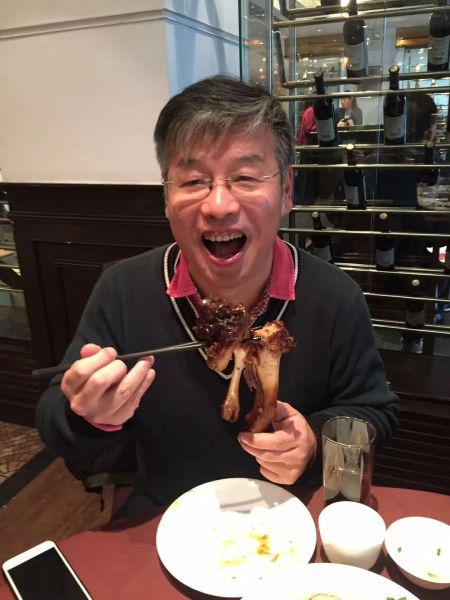
Yi Sha
CHARLES BUKOWSKI’S TIME
allen ginsberg recites all naked gets himself famous
bukowski doesn’t care
drinks & writes drinks & writes drinks & writes fucks when it’s time
gary snyder takes to the mountains becomes a hermit gets famous too
bukowski doesn’t care
drinks & writes drinks & writes drinks & writes fucks when it’s time
robert frost recites at kennedy’s inauguration
bukowski doesn’t care
drinks & writes drinks & writes drinks & writes fucks when it’s time
sartre refuses his nobel & calls bukowski “america’s best poet”
bukowski doesn’t care
drinks & writes drinks & writes drinks & writes fucks when it’s time
camus accepts his nobel & calls bukowski “greatest writer of the us”
bukowski doesn’t care
drinks & writes drinks & writes drinks & writes fucks when it’s time
someone calls him a second shakespeare someone calls him new hemingway
he doesn’t care
drinks & writes drinks & writes drinks & writes fucks when it’s time
sylvia plath does away with herself
bukowski doesn’t care
drinks & writes drinks & writes drinks & writes fucks when it’s time
anne sexton offs herself too
bukowski doesn’t care
drinks & writes drinks & writes drinks & writes fucks when it’s time
robert bly holds recitals & marches against vietnam war & it’s a big deal
bukowski doesn’t care
drinks & writes drinks & writes drinks & writes fucks when it’s time
czesław miłosz from poland lives in america & receives a nobel
bukowski doesn’t care
drinks & writes drinks & writes drinks & writes fucks when it’s time
joseph brodsky from soviet russia becomes american receives a nobel
bukowski doesn’t care
drinks & writes drinks & writes drinks & writes fucks when it’s time
his poetry sells better than ginsberg’s #1 in his country
bukowski doesn’t care
drinks & writes drinks & writes drinks & writes fucks when it’s time
one after one the elite of the era become bukowski fans
bukowski doesn’t care
drinks & writes writes & drinks fucks when it’s time
john ashberry flits like a butterfly between universities & poetry festivals
bukowski doesn’t care
drinks & writes drinks & writes drinks & writes fucks in time
doesn’t care doesn’t care doesn’t care doesn’t care
drinks & writes drinks & writes drinks & writes drinks & writes
fucks in time till he can’t anymore
alive in time croaks when it’s time
November 2018
Translated by MW in November 2018
查尔斯.布考斯基的时代丨伊沙
艾伦.金斯堡赤身裸体当众朗诵暴得大名
他不为所动
喝酒写作喝酒写作喝酒写作喝酒写作该操就操
加里.斯奈德跑到山中隐居竟也出名
他不为所动
喝酒写作喝酒写作喝酒写作喝酒写作该操就操
罗伯特.弗罗斯特在肯尼迪总统就职典礼上朗诵
他不为所动
喝酒写作喝酒写作喝酒写作喝酒写作该操就操
拒绝了诺贝尔文学奖的萨特称其为"美国最好的诗人"
他不为所动
喝酒写作喝酒写作喝酒写作喝酒写作该操就操
接受了诺贝尔文学奖的加缪称其为"美国当代最伟大的作家"
他不为所动
喝酒写作喝酒写作喝酒写作喝酒写作该操就操
有人称其为"第二个莎士比亚"有人称其为"新海明威"
他不为所动
喝酒写作喝酒写作喝酒写作喝酒写作该操就操
西尔维娅.普拉斯把自己解决了
他不为所动
喝酒写作喝酒写作喝酒写作喝酒写作该操就操
安妮.塞克斯顿又把自己干掉了
他不为所动
喝酒写作喝酒写作喝酒写作喝酒写作该操就操
罗伯特.勃莱举办反对越战巡回朗诵会大出风头
他不为所动
喝酒写作喝酒写作喝酒写作喝酒写作该操就操
旅居美国的波兰诗人米沃什获得了诺贝尔文学奖
他不为所动
喝酒写作喝酒写作喝酒写作喝酒写作该操就操
加入美籍的苏联诗人布罗茨基获得了诺贝尔文学奖
他不为所动
喝酒写作喝酒写作喝酒写作喝酒写作该操就操
诗集销量超过金斯堡成为美国之最
他不为所动
喝酒写作喝酒写作喝酒写作喝酒写作该操就操
这个时代最精英的艺人们纷纷做其铁粉
他不为所动
喝酒写作喝酒写作喝酒写作喝酒写作该操就操
约翰.阿什贝利像花蝴蝶一样穿梭在名大学与诗歌节之间
他不为所动
喝酒写作喝酒写作喝酒写作喝酒写作该操就操
不为所动不为所动不为所动不为所动
喝酒写作喝酒写作喝酒写作喝酒写作
该操就操操不动了就不操了
该活就活活不动了该死就死
2018.11
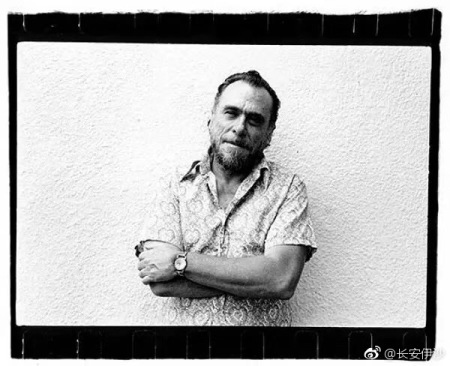
Yi Sha
WHEN I AM OLD
When I am old,
don’t have too much to say anymore,
I’ll be quiet and remember
my ordinary life
I couldn’t escape.
No too many things to keep in mind,
my whole life
I just wrote a few poems.
I will think of
these moments when it happened,
not the final results,
the hour when something came down from heaven.
2000
Translated by MW, November 2018
Yi Sha
WENN ICH ALT BIN
wenn ich alt bin
nicht mehr zu viel zu sagen hab
werd ich mich still erinnern
das ganze gewöhnliche leben
dem ich nicht entkommen bin
ich werd nicht an sehr viele sachen denken
mein ganzes leben
hab ich nur ein paar gedichte geschrieben
was mir einfallen wird
sind die momente wo es passiert ist
nicht die resultate
die stunde wenn etwas vom himmel herunterkommt
2000
Übersetzt von MW im November 2018
当我老了
诗/伊沙
当我老了
已没有多余的话
我会静静回忆
自己的一生
无法免俗
我不会想起很多事
我的一生
只写过几首诗
我会想起
它们发生的瞬间
不是最后的结果
是它们自天而降的时刻
2000
Yi Sha
DOG-FUCKING REALM
This realm of Chinese poetry
is not banal at all.
Poets
with not one famous poem
can point their finger
when and wherever at any poet
who holds a whole bunch.
“He has not one good thing,
all he writes is garbage!”
This is
a most familiar sight.
But if you say
this is fair,
there is justice-
you are full of shit.
November 2018
Translated by MW, Nov. 2018
《狗日的诗坛》
中国诗坛
一点也不庸俗
一首名作
都没有的诗人们
可以随时随地指着
手握一串名作的诗人说:
"他一首好诗都没有
写的全是垃圾!"
这是
平常而又平常的一幕
但如果你认为
这是合理的
无关公平正义
那么你就是一泡狗屎
Yi Sha
NPC-ATLAS
– als Vorwort für den Sammelband des 7. Jahres
Nach der Mittagszeit
am Bahnhof in Osaka
in einem Cafe
trink ich Kaffee
und denk an die Frage
ob in unserer Neuen Poesie aus China
Gedichte über Japan drin sind
oder in Japan entstandene.
Bei den ersteren fällt mir Zhu Jian ein,
bei den letzteren Su Liming.
Dann denk ich wie die heutigen Dichter
in NPC ihre Welt beschreiben
und vor meinen Augen entsteht
ein Weltreich der Poesie.
Juli 2018
Übersetzt von MW im November 2018
新世纪诗典》第七季(将出)代序
《新诗典》的版图
午后
在大阪驿的
一家咖啡馆里
喝着咖啡
想到一个问题
《新诗典》中
有没有写到日本
或写于日本的诗
前者想起朱剑
后者想起苏历铭
继而想到《新诗典》中
那些当代中国诗人
写世界的诗
眼前呈现出一幅
辽阔的诗国版图
(2018)
2月4日 01:39
Yi Sha
GROSSES UND KLEINES FAHRZEUG
auf einem lastwagen in laos
frag ich zhang xiaoyun den laienbruder
hinayana und mahayana-buddhismus
was ist der unterschied
bruder zhang sagt langsam im südlichen ton:
“großes fahrzeug ist ein großer bus
kleines fahrzeug ist eigener wagen”
ich hab verstanden!
“hinayana ist selber schreiben,
mahayana ist NPC machen …”
“genau!” sagt bruder zhang,
aber 900 buddhas
wieviele busse braucht man da
denk ich im stillen
Februar 2018
Übersetzt von MW im November 2018
《大乘与小乘》
在出行的皮卡上
向张小云居士请教
南传佛教以及
大乘小乘的区别
张居士南音款款地说:
"大乘是大巴
小乘是坐驾⋯⋯"
我听明白了:
"小乘是自己写诗
大乘是做《新诗典》⋯⋯"
"对"张居士肯定地说
"可是将近九百个菩萨
得多少辆大巴啊?"
我在心里说
标签:age, Albert Camus, Allen Ginsberg, Anne Sexton, art, buddhism, charles bukowski, countries, Czeslaw Milosz, 美国 America, death, drinking, Europe, fucking, Gary Snyder, heaven, hinayana, history, inspiration, Japan, Jean-Paul Sartre, Joseph Brodsky, Kennedy, language, Laos, life, literature, mahayana, memory, moment, Nobel prize, NPC, old, poetry, poets, Poland, politics, protest, religion, Robert Bly, Robert Frost, shit, society, soviet union, success, suicide, Sylvia Plath, time, Vietnam, war, world, writing, yi sha, 新世纪诗典
发表在 1950s, 1960s, 1970s, 1980s, 1990s, 2000, 2000s, 2010s, 2018, 20th century, 21st century, Antique times, February 2018, Middle Ages, November 2018, NPC, October 2018, poetry, Translations, Uncategorized, Yi Sha, 新世纪诗典, 伊沙 | Leave a Comment »
9月 8, 2018
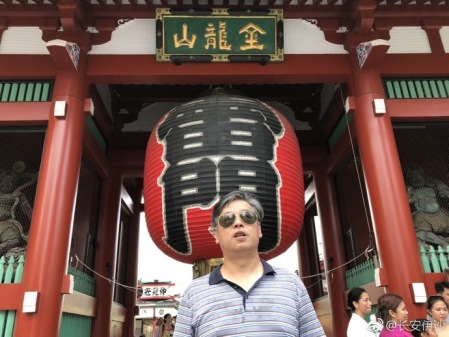
Yi Sha
QUEST
It was in 1999,
last year of the 20th century.
The poet Ma Lan
with her American husband,
a Yale professor,
came to visit old Chang’an.
At the Small Wild Goose pagoda
in the teahouse Scented Snow Sea
we had a good meeting.
The Yale professor
of Chinese literature
had a point of view
that opened my eyes
and resonated in my heart,
I had been thinking about this for years.
He said, “In the May Fourth era,
those writers who studied in Japan,
why were they so dominant?”
Today, I am finally in Japan
and I carry this question,
roaming the coast and mountains of Honshu.
Let me think,
let me think it over,
I have enough time to think of an answer.
What was it,
what was it here,
that made them
bury themselves in their work,
lay their life on the line,
fight for truth,
plead for the people
and become the backbone of modern China?
July 2018
Tr. MW, Sept. 2018
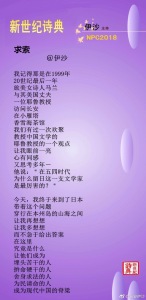
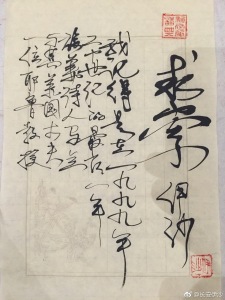
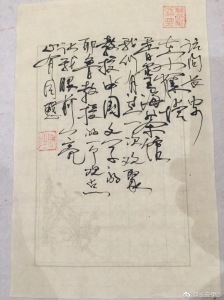
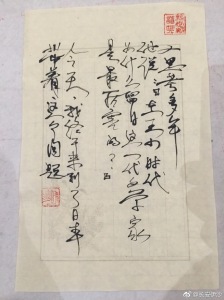
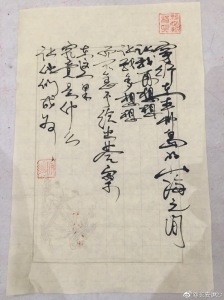
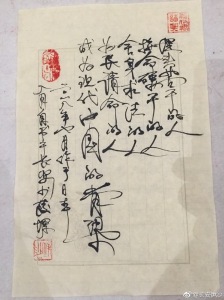

伊沙主持 | 新世纪诗典8一周联展(2018.8.26——9.1)
标签:answer, Chang'an, Charles Laughlin, china, 美国 America, dreams, enquiry, 马兰, history, ideals, ideas, Japan, life, literature, Ma Lan, meeting, memory, modern, NPC, pagoda, people, poetry, question, rights, scholarship, students, studies, teahouse, thinking, tradition, travel, truth, University, values, visit, work, writers, writing, Xi'an, Yale, yi sha, 新世纪詩典, 伊沙
发表在 1900s, 1910s, 1920s, 1930s, 1990s, 1999, 2000s, 2010s, 2018, 20th century, 21st century, August 2018, July 2018, NPC, poetry, September 2018, Translations, Uncategorized, Yi Sha, 新世纪诗典, 伊沙 | Leave a Comment »
9月 7, 2018

Xiang Lianzi
JAPAN VISA
I hand over
my household registration,
my ID card.
my passport,
a certificate from my work
for how many years of employment,
how much I make every month,
how many days of vacation they gave me,
how much of that I’ll be spending abroad.
Proof that I own my apartment,
dirver’s licence,
bank certificate, signed and stamped
about my income this year
and over 100.000 in my my account.
It wasn’t easy, but someone
went for me to the people’s court
in another city 500 miles away
and copied
my divorce agreement
from 27 years ago.
My Shiba Inu,
pure Japanese breed,
secretly
went along after me,
also like some kind of
proof.
6/9/18
Translated by MW, Sept. 2018
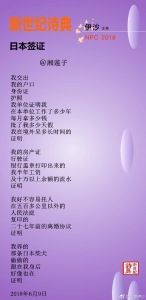


伊沙主持 | 新世纪诗典8一周联展(2018.7.15——7.21)
标签:abroad, account, apartment, certificate, court, distance, divorce, documentation, dog, economy, history, Japan, law, life, marriage, memory, NPC, poetry, proof, situation, society, travel, visa, work, 新世纪詩典, 湘莲子
发表在 2010s, 2018, 20th century, 21st century, July 2018, June 2018, NPC, poetry, Translations, Uncategorized, 新世纪诗典 | Leave a Comment »
8月 7, 2018
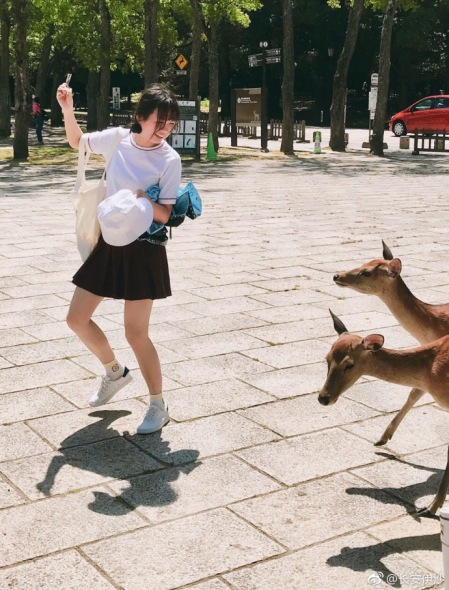
Yi Xiaoqian
ALTER CHAUFFEUR
der fahrer auf unserer japanreise
ist ein über siebzigjähriger
alter japaner
jedesmal wenn ich einsteig
grinst er und zwickt mich
am doppelkinn
jiang tao unser reiseleiter erklärt mir
alte japaner
sind alle lustmolche
wahrscheinlich weckst du in ihm
etwas von seine jugend
aber nicht so schlimm
lass ihn bisschen zwicken
dann ist er zufrieden
und er fährt uns alle
noch ein bisschen sicherer
Übersetzt von MW im August 2018
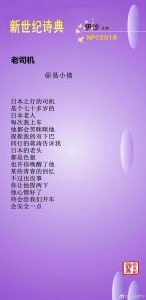
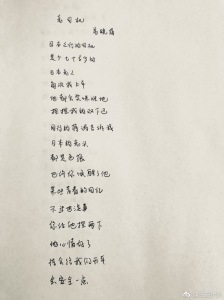
标签:age, bus, driver, female, history, Japan, male, memory, NPC, old age, poetry, safety, sex, traffic, travel, Yi Xiaoqian, youth, 新世纪詩典, 易小倩
发表在 2018, 20th century, 21st century, August 2018, July 2018, NPC, poetry, Translations, Uncategorized, 新世纪诗典 | Leave a Comment »
8月 6, 2018
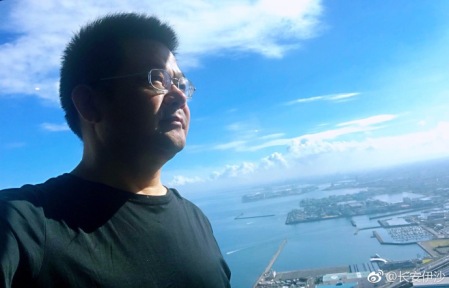
Jianghu Hai
TOKYO PASTA
Across the road from Tokyo Prince Hotel
in a train station basement
I ate a pasta I had never tasted
outside of my family’s home Matoushan
deep in China.
The flour is ground, dried in the sun,
beaten into a dough, pressed into strings,
these are dried again.
To the sound of the big village drums,
the pasta is born in a fine-tuned process.
It’s very resilient, every bite fills your mouth
with the scent of the grain.
I left home when I was 14,
had all sorts of pasta, sweet sour spicy,
strong kinds of taste, made very fast,
so the scent of my hometown
went very far away in the distance.
Never thought I would find it at this moment in Tokyo.
Above there are trains arriving and leaving,
producing a rhythm of deep and high notes
very much like the drums
of Matoushan.
7/25/18
Translated by MW, August 2018
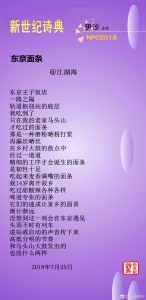
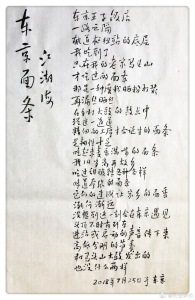
标签:childhood, china, city, drums, family, food, history, home, Japan, Jianghu Hai, life, memory, music, noodles, NPC, pasta, poetry, station, taste, time, town, tradition, traffic, trains, travel, work, youth, 新世纪诗典
发表在 1950s, 1960s, 1970s, 1980s, 1990s, 2000s, 2018, 20th century, 21st century, August 2018, July 2018, NPC, poetry, Translations, Uncategorized, 新世纪诗典, 江湖海 | Leave a Comment »
5月 4, 2018
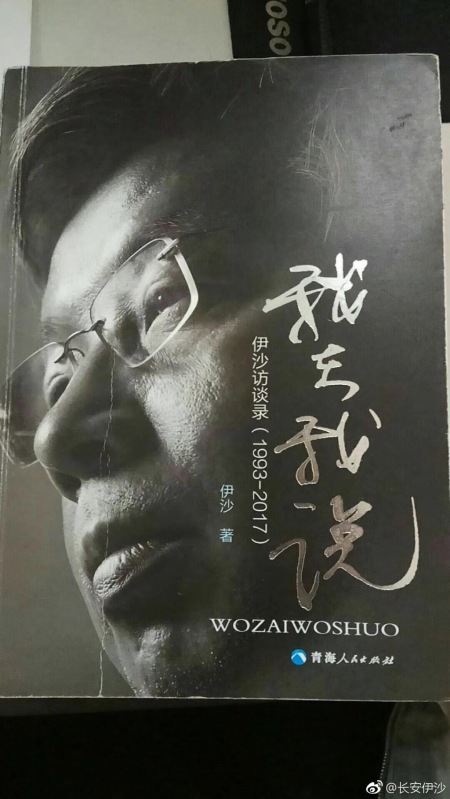
Yi Sha
DREAM 1271
sleep is being buried alive
waking up is being dug out again
dream is the world
when you open your eyes
in the dirt
April 2018
Tr. MW, May 2018
Yi Sha
DREAM 1274
The Poemlife BBS is still active,
someone has posted
my numbers are fake.
In my NPC I never presented
900 people or 2500 poems.
I’m having serious self-doubts,
even thinking,
“If he says it, goddamn, it must be true.”
April 2018
Tr. MW, May 2018
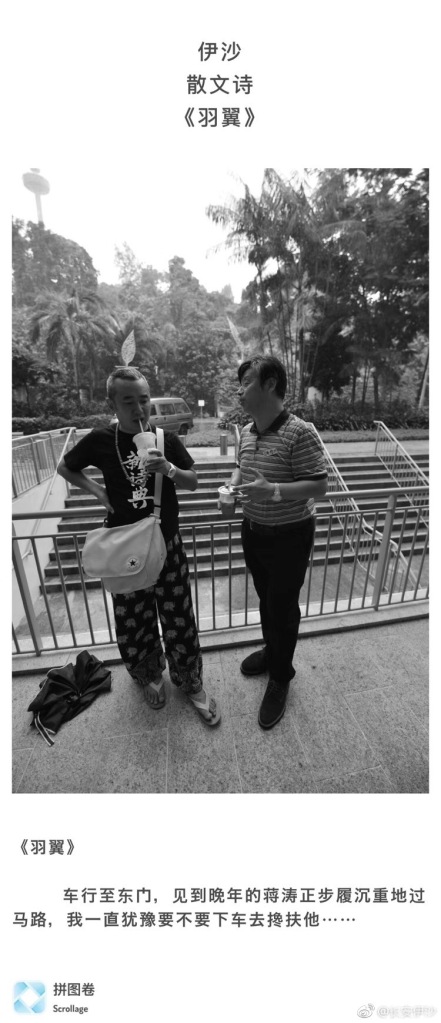
Yi Sha
DREAM 1276
NPC poets visit Japan
Jiang Tao shoots
one adult movie per person
as soon as they know
these movies won’t enter China
it’s no big deal
April 2018
Tr. MW, May 2018
Yi Sha
DREAM 1277
I am a Barça manager,
but not the general manager.
The general manager wants to buy
two Suárez clones.
I strongly object,
thinking he doesn’t know about football.
April 2018
Tr. MW, May 2018
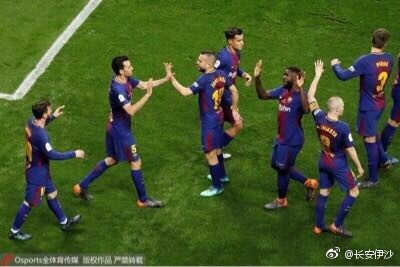
Yi Sha
DREAM 1279
A strange girl,
doesn’t exist in reality,
uses the phone in a kiosk
(doesn’t exist anymore)
to call her parents.
Her happy laugh makes you smile.
Your relationship with her
is revealed at the end of the dream.
April 2018
Tr. MW, May 2018
Yi Sha
DREAM 1280
In a crowd
I hold Wang Youwei by the arm,
he can hardly stand
after drinking.
I turn around,
my bag has been snatched,
everything I have on this trip
was in there.
What do I do now?
I think of returning home
and I’m not afraid anymore.
My home with my mother
alive.
April 2018
Tr. MW, May 2018
Yi Sha
DREAM 1282
dreams:
the subconscious
is making wine
April 2018
Tr. MW, May 2018
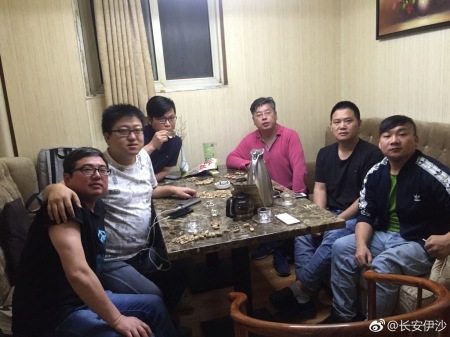
标签:alcohol, Barcelona, china, clones, 王有尾, doubt, dreams, 蒋涛, fake, false, family, film, football, friends, girl, history, home, internet, Japan, Jiang Tao, kiosk, life, memory, mother, movies, numbers, parents, poetry, pornography, relationship, sleep, soccer, stars, subconscious, telephone, theft, travel, Wang Youwei, wine, yi sha, 伊沙
发表在 2018, 20th century, 21st century, April 2018, May 2018, poetry, Translations, Uncategorized, Yi Sha, 伊沙 | Leave a Comment »
12月 12, 2017
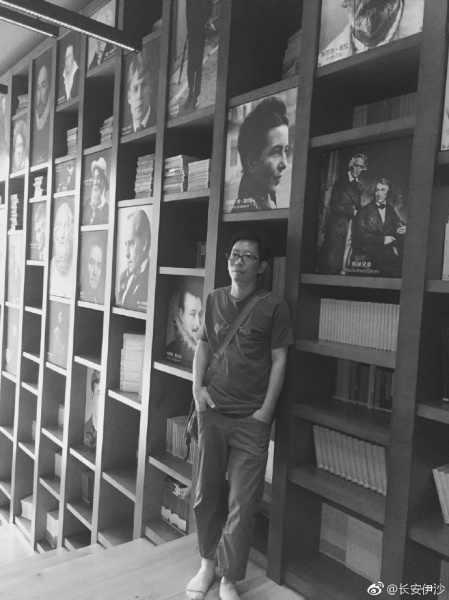
Qizi
GESCHICHTEHUND
die japaner sind gekommen
auf ihrem kriegsschiff
die japaner sind weggefahren
auf ihrem kriegsschiff
aber einen hund
haben sie hier gelassen
der hund war herumgelaufen
vor verschiedenen imbisständen
hatte seine pfoten gefaltet
und wie ein mensch um fressen gebettelt
dann ist er zum hafen gerannt
um auf die japaner zu warten
die japaner sind nicht zurückgekommen
mein patenopa
hat den hund aufgenommen
viele jahre später
während einer politischen kampagne
hat ihn jemand angezeigt
und der hund war der beweis
für seinen landesverrat
18. September 2017
Übersetzt von MW im Dezember 2017
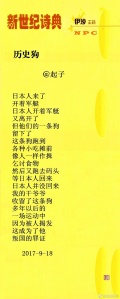
标签:animals, begging, campaign, china, dog, 起子, food, history, Japan, Japanese, movement, NPC, paws, poetry, politics, port, Qizi, ship, street stalls, vessel, war, 新世紀詩典
发表在 1930s, 1940s, 1945, 1950s, 1960s, 1970s, 20th century, 21st century, December 2017, NPC, poetry, Translations, Uncategorized, 新世纪诗典 | Leave a Comment »
10月 6, 2017
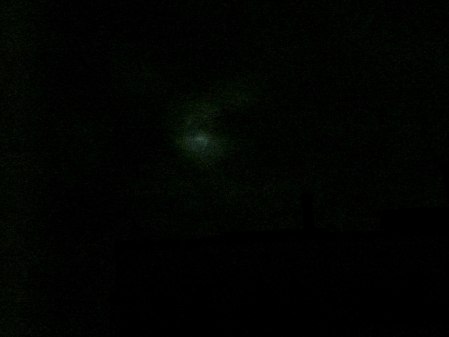
Photo by Juliane Adler
MONDFEIERTAG
gestern war mondfeiertag,
mondfeiertag war heuer recht spät.
15.8. im mondkalender.
oft ist es ende september,
paar tage vorm nationalfeiertag.
nationalfeiertag in der volksrepublik,
staatsgründungstag 1. oktober,
proklamiert 1949
vom tor des himmlischen friedens.
also nicht in taiwan,
dort haben sie am 10.10.
nationalfeiertag.
mondfest ist nahe bei den paraden.
stillgestanden!
rührt euch!
stillgestanden!
alle augen nach vorn
auf das gold!
das ist ein gedicht von yi sha.
wàng qián kàn,
alle augen nach vorn auf das geld.
das war die parole
seit den 80er jahren.
yi sha schreibt in xi’an.
xi’an hat früher chang’an geheißen,
es war sehr lange hauptstadt,
viel länger als peking.
also sehr viele mondfeiertage.
vielleicht auch paraden?
jedenfalls hauptstadtparaden
vor 1000 jahren
vielleicht vor 1300 jahren
erste millionenstadt auf der erde
vielleicht sogar größer als konstantinopel
aber noch ohne panzer.
also kein platz des himmlischen friedens.
keine demonstrationen von millionen.
yi sha hat in peking studiert,
ende 1989
ist er nach xi’an zurückgekommen.
mondfest hat nichts mit paraden zu tun.
mondfest ist für die familie.
man steigt auf eine höhe,
bringt essen und trinken,
alle sehen den mond.
man denkt auch an die, die nicht dabei sind
die dazugehören
und vielleicht den mond sehen können.
mondfest ist überall
in vietnam und in japan
in korea, norden und süden,
in malaysia, auf den ryukyu-inseln,
auch auf hawaii.
ich glaub eher nicht bei den tibetern,
aber doch bei mongolen
obwohl die mondkuchen
oder das allgemeine verschenken
von diesen kuchen mit zetteln drinnen
angeblich gegen mongolen gewirkt hat.
mondkuchen gibts in vietnam und korea,
auf okinawa und den ryukyu-inseln.
in japan sonst gibt es sowas wie knödel.
wir haben zwetschgenknödel gegessen.
zwetschgenknödel aus topfenteig
von meiner mutter.
also ohne mondkuchen
aber mit großeltern und zwetschgenknödeln.
wir haben auch an andere gedacht,
die anderen großeltern
die vielen freunde
alle denen mondfest vielleicht etwas sagt.
alles gute an alle!
auch an nitram retniw!
meine tochter glaubt das muss eine frau sein
sehr verdächtig
vielleicht eine verhüllte
das ist in österreich jetzt verboten
der mond hat sich gestern nicht dran gehalten
bitte lest nitram retniw von hinten
er wünscht euch alles gute!
MW 5. Oktober 2017
标签:anywhere, army, asia, austria, beijing, cakes, capital, capitalism, china, cities, cookies, countries, country, culture, demonstrations, drink, dumplings, East Asia, Europe, family, filling, food, friends, gate, gender, gold, Hawaii, history, holidays, identity, Japan, Korea, language, law, life, Malaysia, man, mask, masked, mayhem, memory, messages, Mid-Autumn, military, millions, money, Mongols, moon, moon cakes, moon festival, nation, national day, Okinawa, parade, people, people's republic, peoples, plums, politics, presence, presents, representations, republic, Ryukyu Islands, Southeast Asia, speech, square, state, streets, taiwan, talk, tibet, tradition, veil, Vietnam, woman, writing, Xi'an, yi sha, 伊沙
发表在 1949, 1980s, 1989, poetry, Tang Dynasty, Uncategorized, Yi Sha, 中秋, 伊沙 | Leave a Comment »
7月 6, 2017
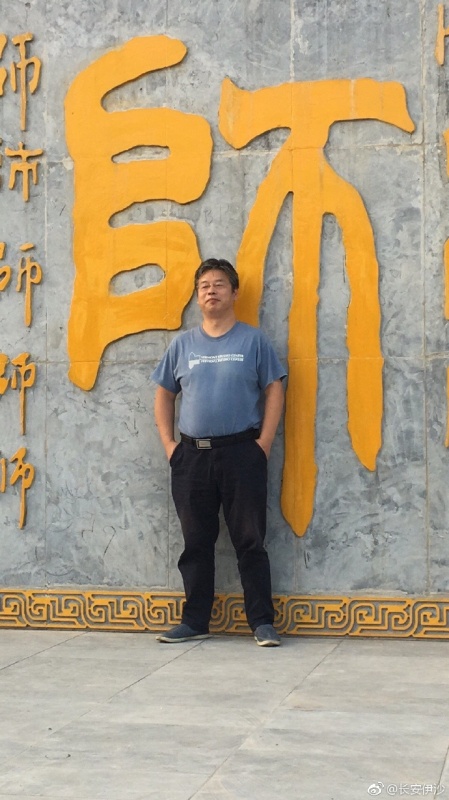
Yi Sha
DREAM 1091
three dreams in one night
one after the other
three blossoms opened
on the same topic:
violence
I dream of two female journalists
from Chinese Business View
they used to interview me all the time
but then I beat up a male reporter
because he stuffed sweet crumbs into my mouth
when I didn’t want it
I dream of a real
Japanese devil
seems very friendly
but there’s no need for mobilization
I want him dead
though those war films haven’t fooled me
I know killing him won’t be easy
I am preparing a saw
I dream of my roommates
at college
we move into a new place together
it’s an apartment with bathroom
I am taking a pee
someone kicks me from behind
I turn around and kick him
to the ground
almost killing him
July 2017
Tr. MW, July 2017
《梦(1091)》
伊沙
一夜三梦
梦连着梦
花开三朵
各表一枝
共享主题:暴力
我梦见两位
曾经长期采访我的
《华商报》女记者
却殴打了一位男记者
起因是他不怀好意地
朝我嘴里塞点心渣子
我梦见一位
真正的日本鬼子
貎似很善良
但无须动员
我非要弄死他
抗日神剧骗不了我
我深知弄死他不容易
我先弄来一把锯子
我梦见大学
同住一室的同学
我们一起搬入新居
是一个单元有厕所
我撒尿时
有人在背后
踹了我一脚
被我反过身来
踹翻在地
差点跺死
2017/7
标签:bathroom, china, college, dormitory, dreams, film, food, history, Japan, media, memory, movies, news, poetry, tools, TV, violence, war, yi sha, 伊沙
发表在 2017, 20th century, 21st century, JULY 2017, poetry, Translations, Uncategorized, Yi Sha, 伊沙 | Leave a Comment »
9月 4, 2016
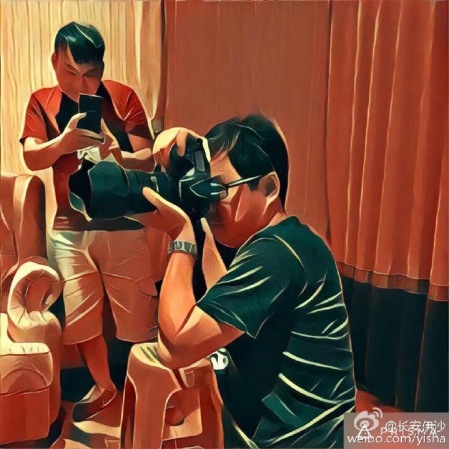
Zhu Jian
MARCH
cherry blossoms
from Tokyo
like blood
falling on
Nanjing
Tr. MW, Sept. 2016
Zhu Jian
MÄRZ
kirschblüten
aus tokio
wie blut
fallen
in nanjing
Übersetzt von MW im Sept. 2016
三月
朱剑
东京的
樱花
血一样
落在了
南京
3월
도쿄의
사쿠라가
피처럼
난징에
내려 앉았다
(美) 文超塵 譯
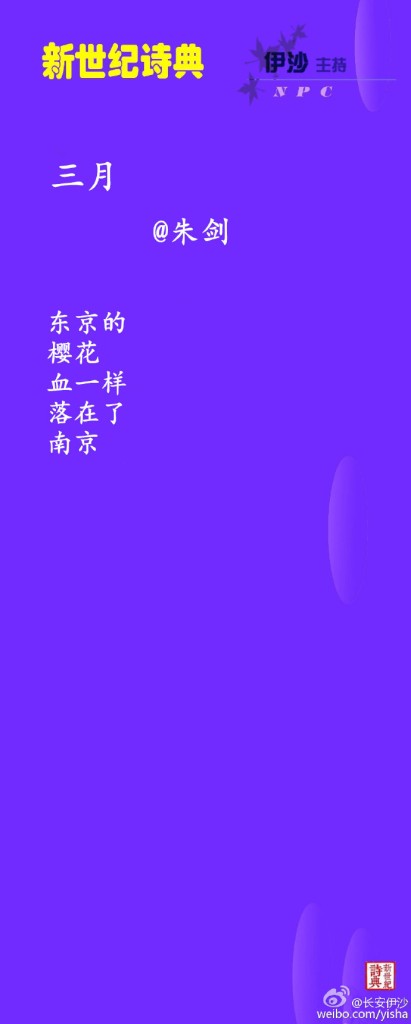
标签:blood, cherry blossoms, china, falling, Far East, Fascism, history, Japan, languages, March, massacre, memory, Nanjing, NPC, poetry, spring, Tokyo, war, Zhu Jian, 新世纪诗典, 朱剑
发表在 1937, March 2016, NPC, poetry, September 2016, Translations, Uncategorized, 新世纪诗典 | Leave a Comment »
2月 24, 2016
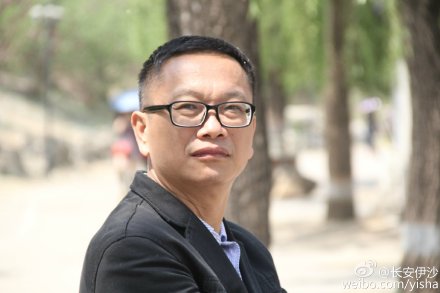
Pan Miaobin
BELLS OF NAGOYA
Night of continuous rain.
Rain digging a well
in winter quite a few years ago.
Many years after,
temple bells of Nagoya in whirling snow
dig up the rain in my ears from the well
from that winter.
Then cherry trees bloom.
Then far away in China
fallen leaves wake up in front of a temple.
Tr. MW, February 2016

标签:bell, blossoms, cherries, china, 盘妙彬, dark, Japan, leaves, Nagoya, Pan Miaobin, poetry, rain, snow, sound, temples, time, trees, well, winter, 新世纪诗典
发表在 February 2016, January 2016, NPC, poetry, Translations, Uncategorized, 新世纪诗典 | Leave a Comment »
11月 9, 2015

Zhu Jian
NANJING MASSACRE
On the walls,
densely written all over,
thousands and thousands.
The names of the dead.
I took one look,
just one look.
Then I had to get out.
Could not turn my head.
I had seen
the name of a friend.
Of course I knew,
it was only the name.
I was almost sure:
Just one more look
I would have seen
my name on the wall.
2010
Tr. MW, 2015
Zhu Jian
NANJING MASSAKER
an den wänden
dicht an dicht
tausende namen
der ermordeten
ich sah einmal hin
warf nur einen blick
dann musste ich raus
ohne den kopf zu wenden
ich hatte einen namen gesehen
den namen eines freundes
natürlich wusste ich
es war nur der name
ich war fast sicher
mit dem nächsten blick
hätte ich meinen
namen gesehen
2010
Übersetzt von MW am 31. Dez. 2013
《南京大屠杀》
墙上
密密麻麻写满
成千上万
死难者的名字
我看见了一眼
只看了一眼
就决定离开
头也不回的离开
因为我看到了
一位朋友的名字
当然我知道
只是重名
几乎可以确定
只要再看第二眼
我就会看见
自己的名字
2010
标签:china, friend, history, Japan, massacre, memory, names, Nanjing, NPC, numbers, poetry, walls, war, writing, Zhu Jian, 南京, 名字, 大屠杀, 新世纪诗典, 朱剑
发表在 December 2013, November 2015, NPC, October 2015, poetry, Translations, Uncategorized, 新世纪诗典 | Leave a Comment »
8月 17, 2015

Picture by Thomas Wong
TIAN’ANMEN
even after tian’anmen
tian’anmen wasn’t always oppressive
you could fly a kite
then came the tanks
in 2009
for the 50th anniversary
of the liberation
this year they celebrate into september
beating the japanese
at least getting rid of them
I’m sure there will be
perfect command
of dancing children
no kites and no pigeons
at least for a while
MW August 2015

标签:1989, army, avenue of eternal peace, children, china, countries, country, doves, dream, history, imagine, Japan, kites, life, memory, peace, pigeons, road, socialism, square, street, Tian'anmen, values, war, 想象
发表在 August 2015, poetry, September 2015 | Leave a Comment »
2月 11, 2014

VALENTIN
der duft der blueten
erinnert an omi
es ist lange her
gar nicht so lang
sie kann bald in den garten
gut eingepackt
anfang februar kommen die blueten
von weitem wie die baeume in taiwan
die baeume in japan
rosa blueten, manchmal weisse
am donaukanal ist auch ein strauch
in zwei tagen ist valentin
MW Februar 2014
标签:blossoms, family, Japan, memory, season, spring, taiwan, Vienna, winter
发表在 February 2014, Uncategorized | Leave a Comment »
10月 9, 2013
伊沙新作(2013年9月) http://blog.sina.com.cn/s/blog_489db0970102eudh.html
Yi Sha
LOB DER JAPANISCHEN PORNOS
reden wir nicht über die sexuelle
befriedigung die ich davon hatte
(sonst heisst es ich propagiere die unzucht)
nur was ich künstlerisch
daraus erkannte
scheinbar heimlich gefilmt
synchron mit der zeit
ungeschnitten fühlt es sich an
als habe man alle männlichen weiblichen
darsteller frisch von der strasse gefangen
das gefühl der nähe zu diesen laien
das selbstvergessene hineinsteigern
rein auf den sex konzentriert
schmierig, geschmacklos, hässlich, gemein
nichts menschliches ist ihnen fremd
diese perverse leidenschaft
hat sicher im stillen
meine verse beeinflusst
meine einstellung beim schreiben
und zwar sehr früh
Übersetzt von MW im Oktober 2013
伊沙
《日本AV颂》
不谈它在性上
给我的满足
(有点诲淫的嫌疑)
单说它在艺术上
带给我的启示
那种仿佛来自偷拍
与时间同步
未经剪辑的真实感
那种每位女优男优
像是从街头拉来的
群众演员的亲切感
那种不回避人性的
猥琐、阴暗、丑陋、邪恶
专注于性本身的
忘我的投入精神
貌似变态的激情
一定在暗中
影响过我的诗
以及我的写作态度
从很早以前开始
标签:art, china, film, Japan, movie, poetry, satisfaction, sex, sexuelle befriedigung, society, writing, yi sha, 伊沙
发表在 October 2013, September 2013, Translations, Yi Sha, 伊沙 | Leave a Comment »
8月 12, 2013
The Globe and Mail article quoted by Paul Manfredi is well informed and sympathetic. But it doesn’t spell out any concrete reasons for Ai Weiwei’s singular status. Ai Weiwei’s status, even after his imprisonment, is that of a “princeling”. It seems to be easier to get rid of Bo Xilai. Bo’s father was one of the “eight immortals” of the Communist Party. Ai Weiwei’s father Ai Qing was a persecuted Communist writer, persecuted under Communist rule since the 1940s. Persecuted before, that’s where he got his name. Most of his colleagues denounced each other. Among famous writers, few seem to have been as obstinate as Ai Qing. He was banished to an army town in Xinjiang, a huge city today. There he cleaned toilets, together with little Weiwei. But after Deng Xiaoping came to power in 1978, Ai Qing became an icon. Unlike Bo Xilai and his henchmen, Ai Weiwei did not build labor camps and organ-harvested Falungong-followers. Before he was arrested, Global Times had published many sympathetic articles about his civil rights activism. And even after his abduction and imprisonment at an unknown location, Ai Weiwei gets to keep his comparatively huge house and grounds and most of his fortune. If he was persecuted too much, the main reason for Ai Weiwei’s status would come out too clearly: It would be awkward to discuss his father’s fate in detail. Cultural policy since the 1940s is no secret to anybody in and around the arts in China. But still. Maybe it would come out too clearly how control over art and literature and everything connected to culture was deemed even more important than in other Socialist countries. How idealism had been betrayed again and again, most effectively with broad domestic and international participation in economic growth after 1989. Ai Weiwei is very different from his father Ai Qing in many aspects, as well from his older brother Ai Xuan, who is also a well-known artist in China. But like his father, Ai Weiwei remains an icon of idealism. It would be awkward and politically dangerous to challenge such icons too much and thus revive ideals in a big way.
The Globe and Mail article quoted by Paul Manfredi gives convincing evidence of Ai Weiwei’s civil disobedience and civil rights engagement. Another good recent piece on Ai Weiwei, his imprisonment in 2011 and comparable phenomena elsewhere around the world is a TED-talk by An Xiao Mina.
Ai Weiwei wrote an indignant indictment of the US behaviour in the Snowden case in The Guardian back in June. That was before the plane carrying Bolivia’s president was refused airspace by France, Spain and Italy on US orders on July 3.
标签:Ai Qing, Ai Weiwei, Ai Xuan, art, canada, childhood, china, civil rights, civil society, contact, culture, dialogue, Global Times, history, Japan, literature, media, memory, nation, politics, prison, repression, rights, Snowden, USA
发表在 August 2013, Uncategorized | Leave a Comment »
8月 6, 2013
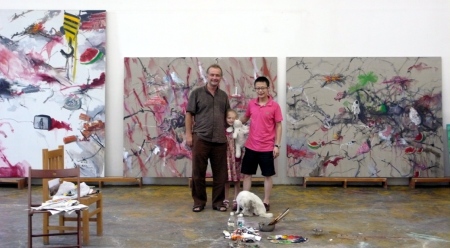
Yang Jinsong and Fans
桜(櫻)
白與粉色漂浮
透著光載入一日
在狂人群眾
樹木兀自開花
生長、成熟、垂落
佇立,迎風呼吸
2011/4
英、德文/ 維馬丁
中譯/ 彤雅立、維馬丁
2012-2013
BLOSSOM
shine and float in white and pink
carried forth into the day
all among the loony people
certainly the trees are blooming
growing, falling, ripening
standing, breathing in the wind
MW April 2011
BLÜTE
weiss und rosa leuchtend schweben
fortgetragen in die tage
unter allen irren menschen
blühen zweifellos die bäume
wachsen, fallen, reifen, stehen
atmen, öffnen sich im wind
MW April 2011
那兒沒啥好說的
維馬丁
那兒沒啥好說的
他們全是建築工
拆掉又蓋上
那兒沒啥好說的
他們是孩子充滿歌
歐羅巴的軍樂
吶喊,旗幟飄揚
那兒沒啥好說的
他們是舞動的秋葉
他們是翱翔的飛鳥
那兒是今年的早熱
在城市的放射器裏
那兒沒啥好說的
他們是販售店鋪
歐羅巴的車
裝飾在黑窗子裏
踐踏小包心菜葉
他們被非法販售
那兒沒啥好說的
他們是古老的城河
每個人保持健康
他們試圖去過活
他們站立在街上
他們賣VCD碟
那兒沒啥好說的
那兒啥都能買
這兒是北京,終究
2004
林維甫 譯
2012
THERE IS NOTHING TO DESCRIBE
there is nothing to describe
they are all construction workers
tearing down and building up
there is nothing to describe
they are children full of songs
european marching tunes
shouting, waving up and down
there is nothing to describe
they are dancing autumn leaves
they are soaring flocks of birds
there is early heat this year
in the city’s radiators
there is nothing to describe
they are selling groceries
and the european car
all decked out in darken’d windows
tramples little cabbage leaves
they are sold illegally
there is nothing to describe
they are ancient city moats
everybody keeping fit
they are trying to get by
they are standing on the street
they are selling vcd
there is nothing to describe
there is everything to buy
this is beijing, after all
MW 2004
那兒沒啥
維馬丁
那兒沒啥好說的
我們是活老百姓
蓋上又拆掉
那兒沒啥好說的
那兒沒啥好交代的
我們是活老百姓
蓋上又拆掉
那兒沒啥好交代的
那兒沒啥好記住的
我們是活老百姓
蓋上又拆掉
那兒沒啥好記住的
那兒沒啥好盼望的
我們是活老百姓
蓋上又拆掉
那兒沒啥好盼望的
那兒沒啥好道歉的
我們是活老百姓
蓋上又拆掉
那兒沒啥好道歉的
那兒沒啥好遺忘的
我們是活老百姓
蓋上又拆掉
那兒沒啥好遺忘的
2007/8
林維甫 譯
2012
THERE IS NOTHING
there is nothing to describe
we are ordinary people
building up and tearing down
there is nothing to describe
there is nothing to explain
we are ordinary people
building up and tearing down
there is nothing to explain
there is nothing to remember
we are ordinary people
building up and tearing down
there is nothing to remember
there is nothing to expect
we are ordinary people
building up and tearing down
there is nothing to expect
there is nothing to regret
we are ordinary people
building up and tearing down
there is nothing to regret
there is nothing to forget
we are ordinary people
building up and tearing down
there is nothing to forget
MW August 2007
<主席>
維馬丁
主席,他不是鳥
主席,他不是飛機
到底主席是什麼?
主席為你作一張椅子
主席,他作所有的腳
主席,他作所有扶手
主席,他作每道靠背
主席,他作所有的椅子
別跟我說你不知道
主媳又是什麼?
主媳也會作這些
主媳作所有的腳
主媳作所有扶手
主媳作每道靠背
主媳作所有的椅子
別跟我說你不知道
2008/3
林維甫 譯
2012
CHAIRMAN
chairman, he is not a bird
chairman, he is not a plane
what is chairman all about?
chairman makes a chair for you
chairman, he makes all the legs
chairman, he makes all the arms
chairman, he makes every back
chairman, he makes all the chairs
don’t tell me you didn’t know
what is chairlady about?
chairlady will make them too
chairlady makes all the legs
chairlady makes all the arms
chairlady makes every back
chairlady makes all the chairs
don’t tell me you didn’t know
MW March 2008
<下次>
維馬丁
下次我是顆石頭
下次人生,你會是什麼?
當你死時,你會是什麼?
這問題並不算精確
那裏並沒有一個世界在下次
當我們累了,它就在這裏
而在早上,神會願意
下次我會是張紙
下次我是個孩子
下次人生,你會是什麼?
當你死時,你會是什麼?
這問題並不算精確
那裏並沒有一個世界在下次
它跟著我們,當我們到那裏
而在早上,神會願意
這次我的孩子在這裏
2007年8月
林維甫 譯
NEXT TIME AROUND
i am a rock next time around
what will you be in your next life?
what will you be when you are dead?
the question is not accurate
there is no world next time around
when we are tired, it is here
and in the morning, god be willing
i’m paper then next time around
next time around i am a child
what will you be in your next life?
what will you be when you are dead?
the question is not accurate
there is no world next time around
it is with us, when we are there
and in the morning, god be willing
my child is here this time around
MW August 2007
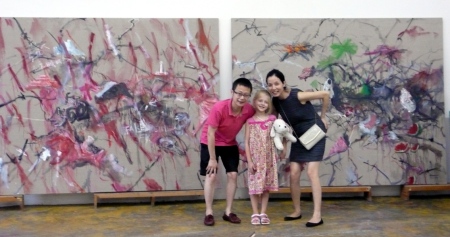
标签:art, austria, beijing, Beijing 2008, china, Japan, language, life, poetry, taiwan
发表在 August 2013, Welcome! | 1 Comment »
10月 22, 2012
I want to thank Charles Laughlin for his recent posts on the MCLC list and on Facebook. His conclusion included these words: “Mo Yan’s critics are expecting the same of him that Mao Zedong would have: the political subservience of writers and their responsibility to serve as the political conscience of the nation”. Now I have written another blog post about this. 罗老师多谢!
Mo Yan’s 莫言 situation is ironic, as Charles Laughlin says. But serving “as the political conscience of the nation” is not the same as “political subservience”. It is rather the opposite. As we know, Murakami Haruki 村上春树 and his colleagues can be “the political conscience” of Japan, making “politically progressive gestures”, but Chinese writers in China, because of “political subservience” cannot be “the political conscience of the nation”, except obliquely in their fiction, poetry etc. Or in the first few days after they win a Nobel.
Along with Charles and many other people I am very glad that after Mo Yan was announced as a Nobel winner, he finally felt up to, or forced to open his mouth as a public intellectual, in contrast to the meaning of his pen name. Now he can be a public figure, like Murakami in Japan, not just an ambivalent functionary and a reclusive writer. Or can he? Is he going to say anything more on China-Japan relations or political prisoners? Is he going to mention Liu Xiaobo 刘晓波 in Stockholm? He will certainly be asked about other Chinese Nobel winners. That’s the nature of this particular prize, whether you like it or not.
Murakami and his colleagues can “serve” as public intellectuals, when their conscience tells them to do something additional to their writing. The irony is that under CCP 中国共产党 rule, there are no public intellectuals in China. There are occasional trouble-makers and commentators, like Ai Weiwei 艾未未 and Murong Xuecun 慕容雪村, Yu Hua 余华 and Wang Shuo 王朔. But can any of them speak their mind in public at length about Sino-Japanese relations or other sensitive topics? Apart from these writers and artists, there are professors like Cui Weiping 崔卫平, who issued the call to turn back to reason in Sino-Japanese relations, which got censored on Sina Weibo 新浪微波. She has often been prevented from traveling abroad. And there are some civil rights lawyers, who sometimes disappear.
Murakami and his colleagues can “serve as the political conscience” of Japanese society in and out of their books. Mo Yan has to be very circumspect with his topics. The Garlic Ballads was censored and supressed for a while. Mao’s “Talks” 讲话 at the “Yan’an Forum” 延安文艺座谈会 helped to make sure writers and artists could not speak their conscience. Vague documents like this have played an important role as instruments of obedience inforcement in one-party societies, as Anne Sytske Keijser and Maghiel van Crevel have shown in a recent article in “De Groene Amsterdammer” (10/17/2012). Mo Yan knows about this dilemma. His comments after he won the Nobel, and even some comments before, suggest he cannot find hand-copying and displaying Chairman quotes quite as harmless as Charles. That would be the difference between working with political realities in China and teaching about them in the US. The conditions of these political realities are still determined by largely the same factors as decades ago. As Keijser and Van Crevel put it, Mao’s “Talks” and other directives are up on the shelf, routinely mentioned in speeches by present leaders, and ready to be enforced again as needed. Yes, Mo Yan and his colleagues fought successfully for enough freedom to write great literature. Isn’t that enough? Not outside the realm of fiction, unfortunately. The cultural achievements of the 1980s couldn’t prevent the 1989 crackdown and everything that stays vague and threatening in theory and practice today.
Mo Yan writes “stupendous” novels, as Charles Laughlin says. Yes, he does. His development as a writer was influenced by the threat of starvation, the brutality in the name of revolution, and by the ideology. Yes, including the Yan’an “Talks”, as Charles shows. Now, Charles says, “China’s writers are receiving much-deserved international recognition simply because they are devoting their souls wholly to literary art.” Yes, they do. Liao Yiwu’s 廖亦武 speech in Frankfurt was in Sichuan dialect 四川方言. The text is available on the Internet. Try to find a video not dubbed into German. The German translation was fine, it just wasn’t dialect or even colloquial German. And it didn’t sound half as humble as Liao himself did. Politics made him into the writer, musician, poet and activist he is now. And his temper, his foolhardiness, as he readily admits. Not a hero, as Jonathan Stalling suggested. The German Book Trade’s Peace Prize has often been awarded to writers such as Orhan Pamuk.
The irony is that in theory, as taught by Charles, “Mao Zedong would have” reminded writers of their “responsibility to serve as the political conscience of the nation.” In practice, he silenced them. Virtually all, in time. So there would be no political conscience. That’s what Orwell’s Nineteen-Eighty-Four is about. Words like “Ministry of Truth” 真理部 are very well-known in China. 1984 is a vision of the closed world of a one-party state. Some moments of life in other societies can feel just as eerie, like a progressive college professor who turns into a cult leader, as in Murakami’s 1Q84, or, even more so, the perfectly cultured killer with secret roots in Korea. But on the whole, Japan in the 1980’s, evocatively and masterfully portrayed, is not ironic enough for connecting to Orwell’s 1984. I guess Taiwan under martial law 台灣戒嚴, in 1984, could have just made it.
Hu Ping 胡平, elected as independent candidate in Beijing’s Haidian district towards the end of the brief Beijing Spring over 30 years ago, recently circulated an excerpt from Mo’s “Life and Death Are Wearing me Out” (Shengsi pilao 生死疲勞). The novel was already well-known before the Nobel. A land owner who had his head blown off in the land reform in 1950 is born again as a farm animal several times, most famously as a donkey. In this excerpt, the donkey/landlord laments his unreasonable and unnecessarily bloody execution, until the guy who shot him tells him he acted with expressive backing from local and provincial authorities, to make sure the revolution was irreversible. So was it “a matter of historical necessity”? I don’t know what Hu Ping meant by circulating the email that somehow ended up forwarded in my inbox, because I don’t follow Chinese exile communications very closely. To me, the excerpt sounds just as absurd, evocative, tragic and yes, “stupendous”, as Mo Yan’s novels usually do. And thus rather close to Orwell’s 1984, or Wang Xiaobo’s 王小波 2015, in a way. I don’t think most readers would think that the author wants to commend, recommend or even excuse such acts of brutality.
There is another irony. Gao Xingjian 高行健 was awarded the Nobel prize for literature in 2000 even though, or maybe because, he did not and does not make himself available for political comments. Gao emigrated to France in the late 1980s and rescinded his Party membership in 1989, and it doesn’t seem he wants to come to terms with the powers that be in China in his lifetime. But on the whole, Gao has made about as many explicit political comments in the last 20 years as Yang Mu 楊木.
Chinese writing in 2012 is very complex. At least there is “much-deserved international recognition”, finally. Yu Hua’s essays “China In 10 Words” 《十個詞彙里的中國》 were serialized in the New York Times 紐約時報, among other international papers. And now Yang Mu, Mo Yan and Liao Yiwu appear together in headlines, also in the New York Times. What more could we wish for?
标签:china, culture, fiction, German Book Trade Peace prize, history, Japan, literature, memory, Newman prize, Nobel prize, politics, taiwan, theory
发表在 October 2012, Uncategorized | 2 Comments »
10月 16, 2012

I like both Mo Yan’s 莫言 and Murakami Haruki’s 村上春樹 novels. But 1Q84 left me disappointed, although it’s brilliantly written. Great evocation of ordinary lives and neighborhoods. But not very much connection to Orwell. No prison. The two lovers escape at a terrible price. Maybe I sort of hoped neither Mo Yan nor Murakami would get it. Although I think they’re both great writers. Murakami deserves great credit for his political candor, both in some of his novels and otherwise. He recently spoke out for a return to reason in Chinese-Japanese relations. After Mo Yan got the Nobel, he also said something in this direction. Mo Yan has never made political comments before. Now he can do it. So maybe it is a good thing that he got the prize.
Making handwritten copies of the speech that was the reference point for decades of repression in literature is an absurd, shameful act.
On the other hand, Mo Yan’s novels could be called an important continuation of the magical realism tradition. The realism of The Garlic Ballads clearly shows the helplessness of peasants and ordinary people in the 1980s. The Republic of Wine is a fantastically powerful indictment of official corruption. Some other novels have broader historic scope. The stories take place in many different periods, under CCP rule as well as before and even in the 19th century. But they are all fantastic tales of familiar people in villages and small towns. Ma Lan’s 馬蘭 How We Killed a Glove 我們如何殺一隻手套 employs different techniques, but when you are in the middle of reading you also realize the details refer to massacres and tragedies that seem very fantastic in hindsight but which are actually quite familiar still for many people even now. So I have great respect for Mo Yan 莫言 and Tie Ning 鐵凝, even though they chair the Chinese Writer’s Association. They don’t even have Party members in their stories, as far as I recall. There are no chairmen or even higher functionaries at all in recent Chinese literature. There are no vindications of official policy, in contrast to the 1950s and 1960s. As to the Yan’an Talks or Yan’an Forum 延安文藝座談會, it was not really a discussion with different voices being respected. Maghiel van Crevel 克雷 has put the whole context together in his book on Duo Duo 多多 in 1995, on the basis of Bonnie McDougall etc. The Chairman had remarkable rhetoric skill, but it can’t be separated from the context of writers disappearing, getting imprisoned and killed, not to speak of other people, right then and there in 1942, on the grounds of what Mao was saying. It’s not the kind of literary theory you can discuss on its own. Socialist realism with its many facets and developments in Hungary, Czechoslovakia, GDR etc. is certainly worth a great deal of attention and discussion, but it is always very directly connected with politics. In some countries, like the former Soviet Union and China, this connection was compounded by dictators considered as intellectuals. Marxism, Socialism and Communism were taboo in the US for a long time. This kind of repression is still quite visible in the propaganda against Obama, who isn’t really leftist at all. And because of this, literary and social theory have a very strong and special status in US academia. Infatuation with China and/or what was perceived as its politics is an additional factor, also in other countries. When I look at the social and political context of literature in China, I prefer Yu Hua 余華 to Mo Yan. But it’s not that simple. Mo Yan is a soldier, joining the PLA was the only way for him to become a writer. He has done and is doing what is possible in his position, and deserves respect.

标签:army, china, freedom of speech, Japan, literature, Nobel prize, politics
发表在 October 2012, Uncategorized | 1 Comment »
3月 21, 2012
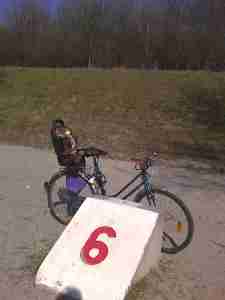
6 on the beach near the northern tip of the island in the danube at vienna, march 20, 2012
island
the danube flows
vienna starts
somewhere downstream.
the island goes
a couple miles
or maybe four.
they have an ice-cream stand today
with buttermilk and radio.
i came to see the cherry trees.
they’re fast asleep.
they need another month or so.
in april we may still have snow.
the cherry trees are from japan.
i went there 19 years ago.
it was before i knew my wife.
i went by boat.
it took two days.
and almost everyone was sick
except the crew.
a boat from china to japan
in january, in ’93.
the plum trees bloomed among the snow.
in february, when i was there.
it’s nice and warm.
the danube flows.
they had an earthquake in japan
a year ago, a little more.
the biggest one they ever had
or maybe not. but very big
with 20.000 people dead
and nuclear power plants kaput.
and still the trees bloomed like before.
it’s nice and warm.
the danube flows.
a month ago the cherry trees
and rhododendrons were in bloom
in taiwan, just a month ago.
it was quite warm. we even swam
in mountain streams.
and austria had lots of snow.
today they read for liu xiaobo
they have a day for poetry
when spring begins, from the un
the 18th was for prisoners
in china and america.
for prisoners of politcs.
they have a day for everyone.
the danube flows.
i brought my son to therapy.
he goes to school. there’s progress now.
he speaks much more.
our daughter doesn’t read a lot
but on the whole we’re doing fine.
the danube flows.
this city is a crying shame.
they say it’s very beautiful.
a neonazi gets a third,
a little less.
a rightist. just like hungary.
a little bit more affluent.
the danube flows.
MW March 20, 2012
This one’s for all the bloggers out there
Susan Sontag: Pay attention to the world
Elfriede Jelinek
政治與戲劇 Vaclav Havel/文 董恆秀/譯
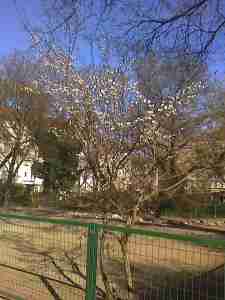
- March 21, Kardinal Nagl Square, U3 subway, Vienna. Many bees in the tree.
岛
多瑙河滔滔不绝
从维也纳开始
顺流而下到某处
在这座岛上
行走几英里
也许四英里
有个卖冰淇淋摊点
还有牛奶和收音机
我来看樱花
它们睡得很熟
它们还需要大约一个月
四月份可能还会下雪
樱花树来自于日本
我19年前去过那里
在我认识我妻子之前
我坐船去的
花了两天时间
几乎所有人都生病了
除了船员
1993年1月
一艘从中国到日本的船
梅花在雪中开放
二月,我在那里的时候
天气美好怡人
多瑙河滔滔不绝
日本发生了地震
一年多一点点之前
他们有过的最大的一次地震
或许不是。但已经算是很大了
有两万人死亡
以及核电站泄露
树依旧像先前一样开花
天气美好怡人
多瑙河滔滔不绝
一个月前樱花
杜鹃花盛开
在台湾,就在一个月前
天气相当暖和,我们甚至在山溪里
游泳
而奥地利还白雪皑皑
今天他们为刘晓波读诗
在他们的诗歌日
春天到来时,联合国规定
18日是囚犯日
在中国和美国
因为政治犯
他们给每个人指定一天
多瑙河滔滔不绝
我带儿子去治疗
他去上学了,现在有了进步
他话说得更多了
我们女儿阅读不多
但总的来说我们做得很好
多瑙河滔滔不绝。
这座城市令人蒙羞
都说它非常漂亮
新纳粹占三分之一
少一点点
极右分子像匈牙利一样
稍微富裕一点
多瑙河滔滔不绝
2012年3月20日
伊沙、老G 译
标签:america, austria, bicycles, blossoms, buttermilk, cherry blossoms, children, china, earthquake, hungary, ice-cream, islands, Japan, literature, memory, nazis, poetry, politics, prisoners, rightists, snow, speech, spring, sun, taiwan, trees, Vienna, 桜
发表在 March 2012, Uncategorized | 3 Comments »
3月 12, 2012
Just read a post by a guy called Doug 陀愚。It begins with a child’s drawing from preschool, and ends with the words 日本は絶対復しますので、それまで頑張りましょう。Nihon wa zettai fukushimasu no de, sore made ganbari mashoo. I don’t know if everything can or should be like it was before after such a big catastrophe. I do have great respect for the spirit Doug talks about. Last year in spring I wrote two poems that were inspired or influenced by the Japan 東北 Toohoku earthquake. I am going to put the second one first here. It was translated recently by a Taiwanese friend, and we both read it in public at a bookstore in Taipei on Febr. 26th.
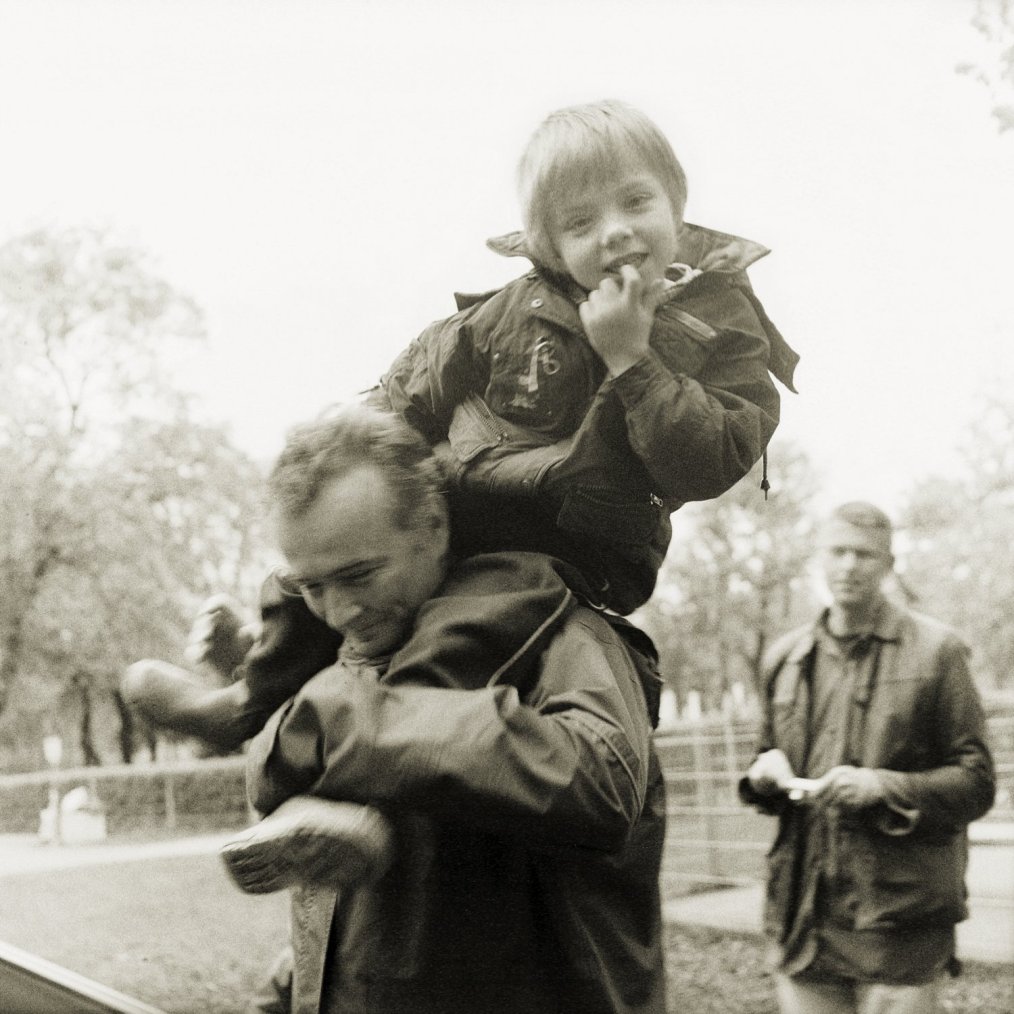
櫻(開花)
英、德文/維馬丁
中譯/彤雅立、維馬丁
白與玫瑰色漂浮
透著光進入一日
在狂人群中
樹木兀自開花
生長、垂落、成熟
佇立,迎風呼吸
=========
桜
blossom
shine and float in white and pink
carried forth into the day
all among the loony people
certainly the trees are blooming
growing, falling, ripening
standing, breathing in the wind
MW April 2011
bluete
weiss und rosa leuchtend schweben
fortgetragen in die tage
unter allen irren menschen
bluehen zweifellos die baeume
wachsen, fallen, reifen, stehen
atmen, oeffnen sich im wind
MW April 2011
Photo by Ronnie Niedermeyer
8 syllables in every line, five trochaic lines, first syllable of every line stressed, then the third syllable, and so on. This is how the German version works, with an additional shorter seven-syllable verse that ends with a stressed syllable, so it’s six lines in all. And in the English version most lines only have seven syllables, except the two in the middle: “all among the loony people/ certainly the trees are blooming”.
Zhan Bing 詹冰(綠血球 Taipei: 笠, 1965), from http://chinaavantgarde.com/
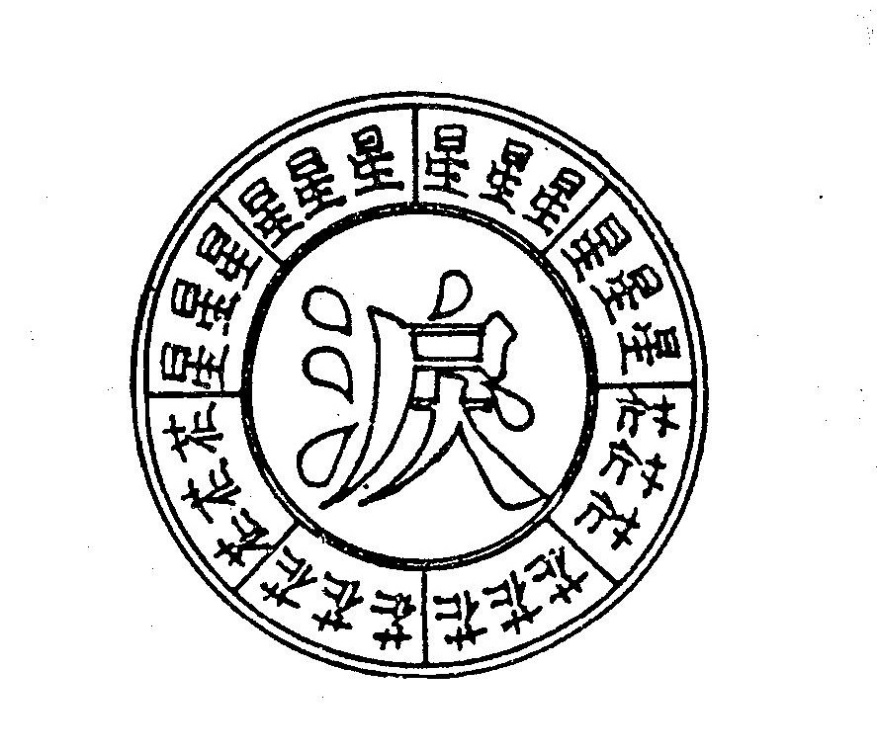
hold it
(quakes, tsunamis, nuclear threats …)
the days of the blossoms
the yellow the white
the shoots and the air
and the birds and the bees
the flies and the beetles
the earth and the trembling
the cars that come floating
the buildings come tumbling
the life that sprouts
MW March 2011
innehalten
(fuer japan, yunnan, burma …)
die tage die blueten
die spitzen die gruenen
die weissen die gelben
die bienen die fliegen
die wogen die steigen
die wagen die treiben
die erde die bebt und
das leben das keimt
MW Maerz 2011
标签:blossoms, catastrophies, cherry blossoms, 生活,gedichte, disaster, earthquake, easter, Gedichte, Japan, life, memory, poetry, spring, translation, trauma, trees
发表在 March 2012, Uncategorized | 5 Comments »
3月 30, 2011
innehalten
(fuer japan, yunnan, burma …)
die tage die blueten
die spitzen die gruenen
die weissen die gelben
die bienen die fliegen
die wogen die steigen
die wagen die treiben
die erde die bebt und
das leben das keimt
MW Maerz 2011

http://tokyowriter.wordpress.com/2011/03/30/quakebook/、http://en.wordpress.com/tag/quakebook/、
hold it
(quakes, tsunamis, nuclear threats …)
the days of the blossoms
the yellow the white
the shoots and the air
and the birds and the bees
the flies and the beetles
the earth and the trembling
the cars that come floating
the buildings come tumbling
the life that sprouts
MW March 2011
标签:Burma, earthquake, Japan, life, quakebook, spring, tsunami, Yunnan
发表在 March 2011, Uncategorized, Welcome! | 2 Comments »
3月 23, 2011
The world-wide reading on March 20 was a big success. In Leipzig, as far as I heard. In Vienna, it was interesting. Instructive. Great experts. Reporters Without Borders. Amnesty International. Writers in Prison, with Helmuth Niederle from the Austrian PEN. Professors from the East Asia departments of Vienna and Bratislava. Poetry. Protesters in China, in prison. Women, peasants, workers. In spirit. In between. Over 90 cities in 33 countries on six continents. At least. Gerhard Ruiss and Bei Ling read in Leipzig. At the book fair.
Herta Müller’s speech on March 20 in Berlin was published in the FAZ on March 26. Very good speech. She has read the biography. Maybe a little too fast. The labour camp didn’t come immediately after the first prison term. He wrote the confession in prison at the end of 1990 and went free in January 1991. Everything else is correct. The episode with his father, who wanted him to give in. And the labour camp. She does take a side, very emphatically. The last sentence is the most important one. “More and more supporters of Charter 08 are disappearing in jail.” Liu Xianbin was sentenced to 10 years a few days ago. Altogether he has been sentenced for more than 25 years since 1989. His most serious crime seems to have been one of the founders of an opposition party at the end of the 1990s. Liu Xianbin’s wife Chen Mingxian chronicles her life in the last 20 years in this account: http://08charterbbs.blogspot.com/2010/10/blog-post_23.html
There is also a good piece in the NY Times by Geng He, wife of the human rights lawyer Gao Zhisheng: http://www.nytimes.com/2011/03/28/opinion/28geng.html
Teng Biao has disappeared, Ran Yunfei has been detained for a while, and now Liu Xianbin has been sentenced to 10 years, to name but a few. The situation is very clear. No progress, just the opposite.
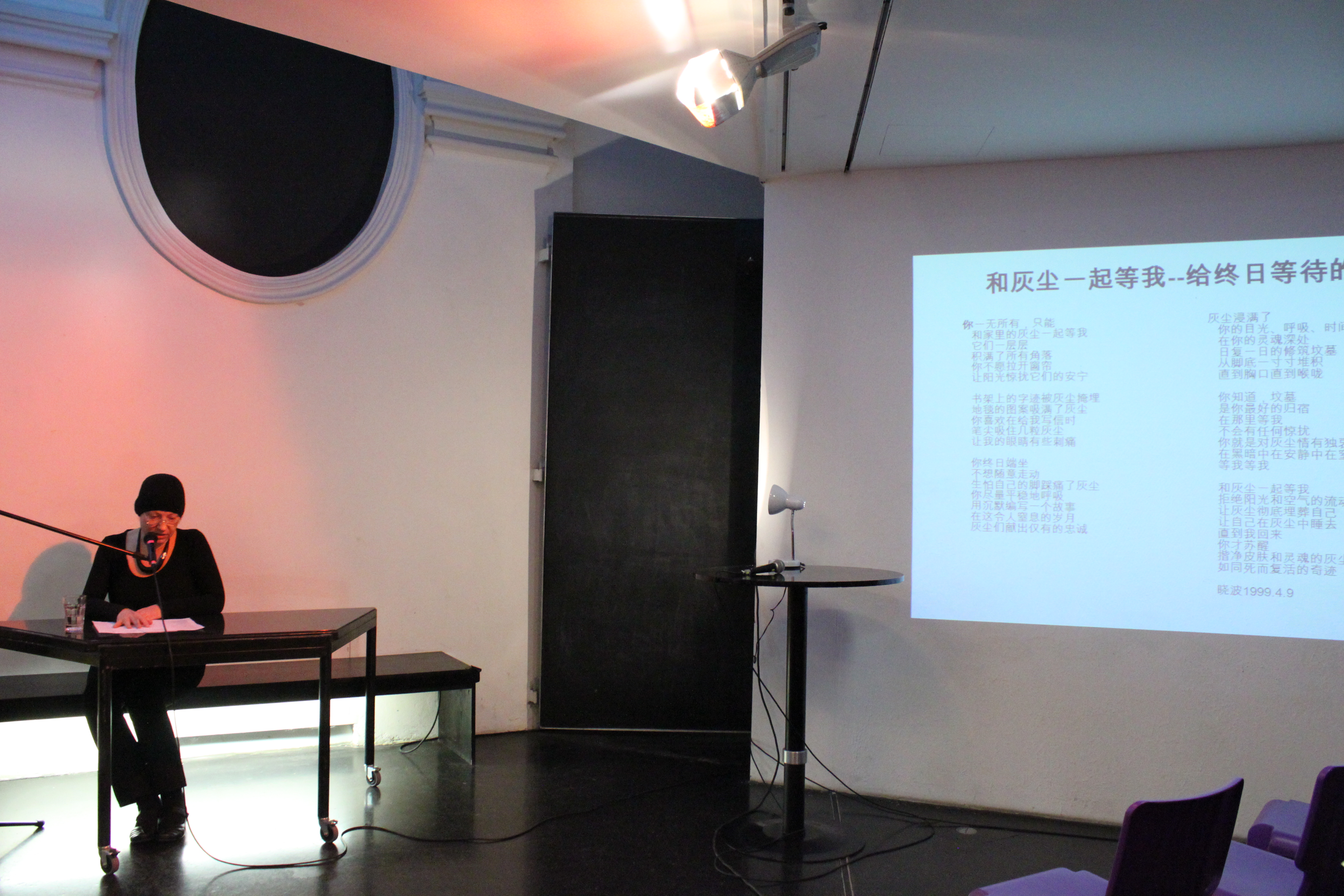
MuseumsQuartier Wien, Raum D / quartier21 - Photo by Pernille Koldbech Fich
There will be a reading with Bei Ling, poet and publisher, in Vienna at the same location on April 12.
标签:Amnesty International, austria, Bei Ling, beijing, china, church, freedom of speech, Gerhard Ruiss, Helmuth Niederle, Japan, Liao Yiwu, Libya, literature, Liu Xiaobo, love, Nobel Peace prize, PEN, poetry, politics, prison, protests, raoul findeisen, Reporters Without Borders, reporting, Rubina Möhring, spring, Vienna, Vienna University, weigelin-schwiedrzik, writers
发表在 March 2011, Translations | Leave a Comment »














































































